On the Red Circle: What it's really like to give a TED talk
By Eric Nguyen
TL;DR
Watch the talk here: “How AI could generate new life-forms”
In April 2025, I gave the biggest talk of my career — on the TED main stage. It was twelve minutes long, but took four months of preparation, panic, rewrites, and personal reflection. I wanted to share a behind-the-scenes look — not just at what it’s like to give the TED Talk, but share the full roller coaster of a journey that it was. It was the best experience of my life.
Thanks for indulging me
I’ve always thought it was weird why people would say they’re “so humbled” after a personal achievement. Shouldn’t they feel the exact opposite? Extremely proud?
I kind of get it now.
I gave a TED talk recently in April 2025, and it was such an emotional roller coaster, but above all, I did feel extremely humbled, and proud at the same time. Here’s this thing that’s been in my head for 4 months, preparing, stressing every single detail, and terrified about how it would be perceived, and then you get to deliver it, it’s out of your head. You’ve shared this “gift” to the world, as TED officials like to describe it.
I definitely felt lucky for the opportunity to share an idea I’m proud of, but at the same time, to put something on such a high pedestal and have so much fear about it, it just reminds you how fragile a person can be, how fazed and susceptible to the perceptions of everyone around you. As a current PhD student, it’s like an academic’s fairy tale story — being picked out of obscurity to be given “15 min” of attention and somewhat feel like a movie star at a conference full of self-proclaimed (and wealthy) nerds. You also know it can’t last.
The experience felt like a drug, and I wanted that high for as long as possible. So much in fact, I decided to write a blog about my experience at TED2025 to share with folks a sense of the journey — because it’s interesting and maybe they can relate a piece of the experience with their own. Maybe we can combat “duck syndrome” too (more on that later).
But honestly, I’m more selfish than that. I want to prolong these emotions of the experience by documenting it so I can relive them over and over. So thanks for letting me have my cathartic diary. Strap in, go to the bathroom first, it’s a long read.
What’s all the hubbub?
To set the stage a bit (ha), the main TED event is a 5 day conference in Vancouver, with about 90 speakers. That’s like 15–20 speakers a day! Information overload to say the least. Each day is broken into 3 sessions, each with their own theme. Maybe it’s parenting, health, or AI warfare.
The big names that I recognized were Sam Altman, Yoshua Bengio and Eric Schmidt, tech heavyweights. To say I was intimidated is an understatement…! There are about 1600 registered attendees, with a whopping ticket price of $12,500. There are smaller TEDx events run independently around the world, but this was the flagship TED event. Gulp.
This would be the biggest talk of my life, by a long-shot. I’ve given dozens of academic talks, but those were all very different. Super detailed and 45 mins to an hour with a Q&A, meant for a scientific audience. This would be the opposite — distill a very complex idea and set of results to a general audience in one fifth of the time. How?! To make things even more fun, no teleprompter. Just you going off your memory. How do I not throw up, yet alone deliver an interesting, powerful and memorable talk? That was the mission, and I accepted. How did we get here?
Is this a scam?
One day in December 2024 I get a LinkedIn message from this fellow. He asks if I wanted to give a TED talk on my work. Honestly, I thought it was a scam. But like, of course I wanted it to be true so I checked out his profile and it looks like there’s some credibility here. To make sure I’m not dreaming and disappointed, I set my expectations low. I expect it to be too good to be true, but I will inquire regardless.
As I message and email back and forth with this TED person, it turns out to be quite true! A different set of emotions erupted. Excitement, disbelief, wondering “why me?” Then also, worry. I was concerned with how my teammates would feel if I spoke about a team effort. Would I be perceived as glory-seeking or someone trying to take all the credit?
As I talked to the TED person, a curator for TED, he explained a few things. He heard about the work after seeing my project, Evo, on the cover of Science and saw some of my academic talks on YouTube. He thought it would fit well with this year’s theme, Humanity Reimagined. In fact, one of the reasons he thought to reach out to me was that because I was a PhD student (at Stanford), and not associated with a big company with a PR team, I could say whatever I wanted, a candid take.
Just as a teaser — my team and I created an AI, called Evo, that could write new sequences of DNA, and it turned out to actually work in real life. So I can see how it might be relevant to the theme of “Reimagining Humanity”. My session was supposed to be #2 titled, “Dual Futures”. He wanted to cover both the “promise and perils” of AI in biology, which scared me a bit. I did not feel like an authority, especially on the perils of biological AI. I didn’t want to be known as the bio “doomer”. But I was extremely excited about our work and wanted to share it with a whole new audience of lay folk.
TED caught me at an “interesting” time. That year (2024) was a roller coaster — some major highs, and some major lows, which at the time of being asked to do TED, I was still smack in the middle of it all. Honestly, it was a pretty dark period. A breakthrough work of my PhD landed on the cover of Science. That was followed quickly by a personal and professional fallout — that I won’t go into detail here. I was in the middle of a retreat into a hole. I was depressed, ashamed, feeling like a failure, and I wasn’t sure if I was ready to come out of that hole. But I had to make a decision right away, and just hoped I’d be up for the challenge. And hey, the actual talk was 4 months away. What’s the worst that can happen? It’s just a video potentially seen by millions on the internet forever.
I mostly kept the news to myself, and with one other teammate. I didn’t want to jinx it, and build up expectations. I also thought there was a decent chance they’d rescind the offer to talk, or invite someone with more clout. “Let’s just focus on crafting the best talk I could”, I decided. “Let’s do this”.
Soul searching
The TED team is world-class for guiding their speakers. I was set up with 2 curators. The first was Bilawal who initially contacted me, and Whitney. They were my OG TED team 🙂. We first started off with a Zoom, just getting situated, brainstorming the different themes we’d like to touch on, how the project started, what are some key messages to get across, very open ended. We laid out the timeline and the expectations. The first step was to just dump all the ideas and thoughts I had into a Google doc to get the juices flowing.
It seemed like the TED curation team cadence for interacting was once every 2–3 weeks (mostly email, sometimes Zoom). However, I knew that I was going to need more hands-on help. I first reached out to my former classmate Kayla Huemer because I knew she was amazing at giving talks herself, and that she enjoyed coaching folks for their big talks. Turns out, she’s helped coach TEDx speakers in the past, and so she was so excited to help with a main TED talk finally. She almost seemed more excited than me! Mainly because I was slightly terrified.
Kayla was based in Nairobi (doing global health work). Our first Zoom meeting she just got some context on my project, and laid out some high level TED ethos regarding talks. A couple key perspectives were very helpful. 1. TED views the talks shared as “gifts” to the world, and 2. It’s all about the “through line”.
I really liked the perspective of viewing the talk as a gift. I just loved that framing, it was very motivating to me. It’s this thing I’m so excited to share, and want others to share in that enthusiasm, wonder and awe as well. More practically though, the through line helped me realize that there needs to be a key message, which represents the “soul” of the talk. Because it’s so time constrained, you really only have time for 1 key idea / takeaway, like if you were to describe the talk in 1 sentence or phrase. This turned out to be extremely hard for me to narrow this sucker down!
What’s the big idea?
For me, I went through many different through lines, like “we should be treating DNA as a language”, or, “to fully understand life, we must be able to create it.” These felt unsatisfying. Regardless, I would craft the narrative around these ideas and see how it flows. It was just trial and error.
I had lots of discussions with Kayla, and she would read my drafts, and fairly often, distill or reorganize my thoughts in a more cohesive way. Then she had a great through line that really just clicked when I saw it. Instead of just “reading” DNA, we should be “writing” it. After some more iterations, it became, we should be “generating” DNA.
And then eventually, I came to my final through line, “to truly understand something, we must be able to create it”. I hope this makes more sense when you watch the video, but the idea is, you can learn by observing, OR, you can learn by creating. For centuries, the focus in biology has been about observing, but that’s been limiting. I’m more motivated to see how we can learn by creating.
The soul of the talk would be about why I thought generating DNA would unlock breakthroughs in science, medicine, and beyond. All the ideas and topics just centered around this through line. If it didn’t support this through line, then it had to be cut out, because again, we’re short on space/time.

My first draft was 2800 words. I sent it to TED and they thought the structure was pretty good. It basically had a hook (with some short context), technical challenge, a description of the project itself and its results, and then future applications and implications of the technology. One key problem, it was more than twice as long as I had time for. What?!
So I originally thought I had 15–18 minutes, but then I got a response saying I actually had 10 mins! Turns out, TED talks have been trending shorter because people’s attention spans are getting shorter. Thanks Tik Tok.
I started the process of gutting the talk, all the extra details, bits of background, or opinions I wanted to share. About 2 months pass by and so many iterations and restructurings with TED, my friend Kayla, and a number of lab mates (whom I’m forever indebted to), I get it down to about 1400 words. I glossed over so many details, but now we’re getting somewhere.
The gut punch
The first real milestone was to fly out to NYC to TED HQ and deliver a practice talk. It’s optional, since you can do it by Zoom. But I dedicated lots of time to TED, and so damnit, I was going to be there in person and do everything I could to make this talk great. I also wanted to meet the other TED speakers. And the real treat, Chris Anderson, the head of TED, invited us to his home in Manhattan for dinner after the practice rehearsal. Woo hoo!
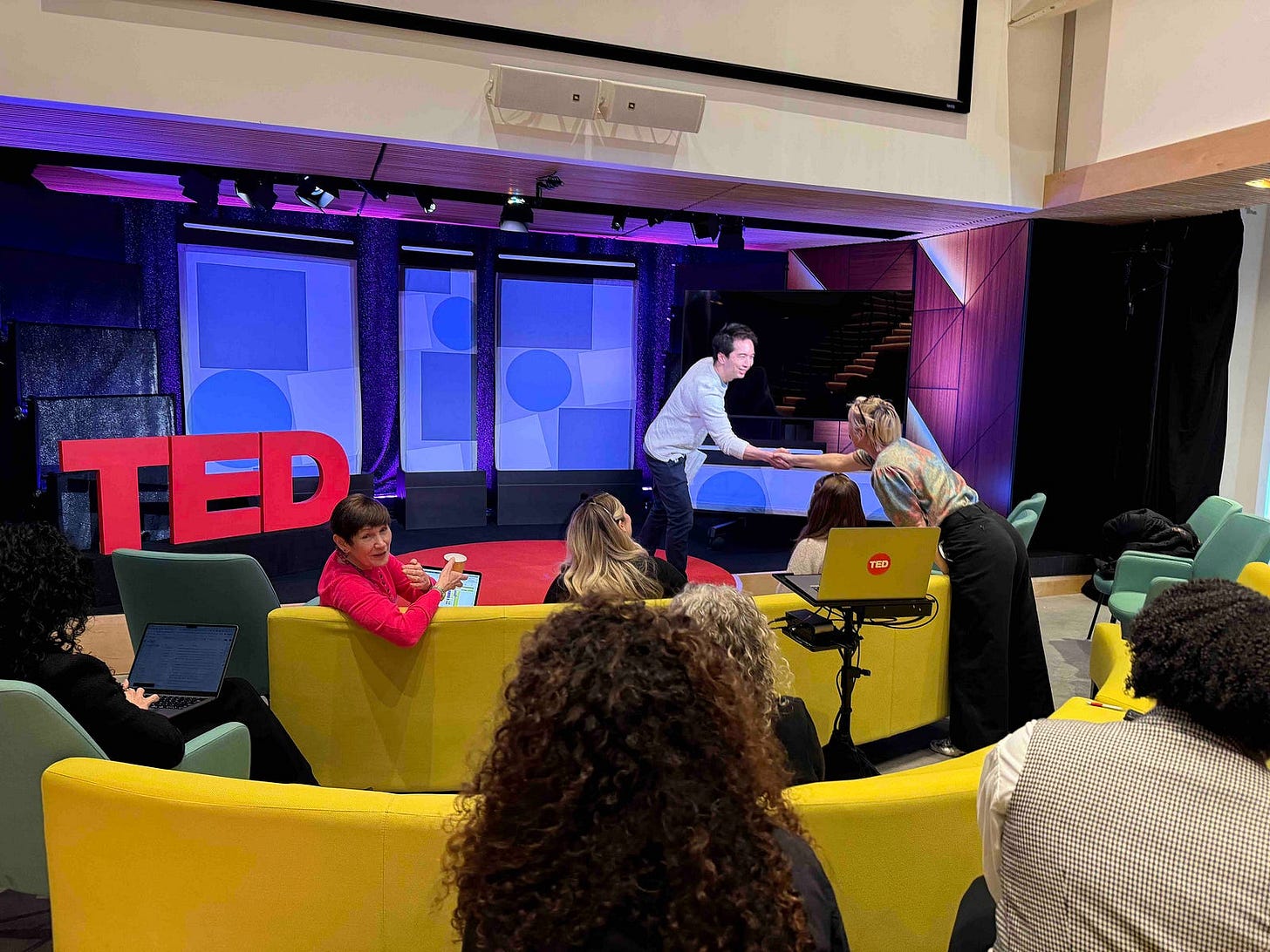
I crashed at my friend’s apartment in Manhattan, since this trip is self-funded. I deliver the talk to my friends Adwit and Romoli by reading my script. We were told we didn’t need to memorize the talk yet because the TED team may make critical changes to it. My friends said it sounded great, so I felt super ready and great!
When I arrive at TED in the West Village, I am greeted by super friendly staff members and they walk me up the building. I met Whitney, my curator, in person finally! Up to that point, we were just emailing and exchanging notes.
I’m early so I ask to sit in on some of the practice talks, and it was sort of a mistake. They have a small stage, but it does look like a mini TED stage, with a red circle, a studio audience, and 10 or so TED staff in the front rows, including Chris Anderson. The first person gives his talk — and geezus, it’s f-in amazing. It’s memorized, the graphics, video and audio are phenomenal, and the talk is engaging and memorable. I think to myself, “we’re supposed to have it this good already??”
And then, I’m next.
I walk up to the stage. My friend Romoli is also in the audience, and I’m feeling ready. Before I start, I’m comfortable, chatting with the TED team, making jokes, and being gracious on stage. I start strong, and deliver the intro to my talk perfectly. At this point, I’m trying to deliver it from memory because the last guy did. Then a brief thought goes through my head, “what happens if I forget something?” That thought grows, and then when I get to the meat in the middle, I actually do forget some parts. Now my mind is racing, “oh god, what happens if this happens at TED live, in the real thing, how horrific would that be?”
At that moment, I lose track of my audience, and what the next line of my talk is. I feel the audience’s eyes looking away, as they tend to when a speaker stumbles, because it’s awkward to look at someone who’s feeling embarrassed on stage. I read the notes in my hand (the printout of the whole talk), which I rely on to get through for the next few minutes, stumbling. I get to the conclusion, which I do deliver fine, because I memorized that part.
The first staged delivery is over. What just happened :/
Shaken, and stirred
Chris A. starts with the initial feedback of my first practice run through by saying it’s a fascinating topic, and the setup is fantastic. But then he lasers in. He was the first person to really ask about the technical details of the project, about what it can do, how it works, and importantly, what it can’t do. I was impressed.
Then he focuses on something that it was missing. He asked, how do you know “it worked”? I wasn’t sure what he meant, we just knew, I thought.
He said the talk needed a climax, a build up. It needed an “ah ha” moment, or a “eureka”!
He was so right! How did I not see that? My previous version was basically just stating that the thing we built just worked. I was “telling”, and not “showing”.
I thought I had my reasons why I didn’t go into technical details. It took a lot of time to explain the science, it’s fairly nuanced/technical, and I thought I’d lose the audience. But I agreed, we needed to convince / show the audience in a more compelling way. The other feedback I got was about when I talk about the ethical implications of the project. I sort of used a “cop out” answer, half in, and half out. I was told to take a stand, one way or the other.
I stick around for a couple more practice talks from other speakers, and realized that the level of preparedness was also all over the place. That first person who was super prepared and basically ready to give his final version was an anomaly. But it was too late, it shook my confidence, and me at my core. I was feeling pretty defeated. I thought I was ready, but clearly I was not. I felt like it was getting real, very fast. At this point, we were 1 month out before the big day. Sounds like a lot, but not really.
On the subway ride home, I was visibly shaken. So much so, the person next to me said to me, “Are you ok? You seem shook”. I asked him why he asked that, and he said it was because “you have no AirPods and just look like you’re thinking”. I told him about the practice TED talk. Turns out, he’s a speech writer himself, including for a couple past presidents. He said, “don’t worry about the feedback, it’s all garbage. You just gotta say what you want to say. The best thing they can do is to make you feel confident before you give your talk.” I really appreciated that bit of advice, it was what I needed to hear at that moment (even though I absolutely planned to incorporate every single piece of TED’s advice, like it was a chip on my shoulder).
An introvert’s worst nightmare
That evening after the practice talk, I show up to Chris’ amazing house for dinner. It’s massive, it’s like a museum inside, or several high end restaurants in one. I meet some other speakers and they’re so eloquent, type A’s, charming, brilliant. I was feeling out of place, and definitely like I had to prove myself, like I was there by mistake. I got to sit next to Chris at dinner, and was a tad intimidated. ~25 years of meeting incredible speakers, what do I even talk about??
Turns out he met his wife at the first TED he went to, and ended up buying it, and turning TED into what it is today. But honestly, he’s just a genuinely good guy, a regular human being interested in big ideas and getting them out in the world.
The hardest part in the evening was having to give an ad-hoc intro about yourself, what you do / what your talk will be about to the entire room. We just went around the tables, like a toast style, and just let it rip. Imagine needing to riff to a room full of literal TED (or soon-to-be) speakers. Does it get more terrifying than that?
My blurb went fine, and it actually got a bit more personal than I expected. My career trajectory is quite windy — civil engineer, management consultant to computer scientist and bioengineer. But mostly, I shared about a 4 year medical hiatus and undergoing 5 major surgeries, which led to a career pivot and going back for a PhD later in life (at 40!), and a mission to find meaning and purpose in my work. “Where did that come from?”, I thought. Honestly, it was probably because everyone was giving such compelling, well articulated origin stories, I guess I felt I needed a compelling story / reason of my own to be in that room. One doctor almost died 5 times, had his last rites given, but then went on to literally find the cure to his own disease. These people were incredible.
Turn the beat around
After the NYC trip, I decided to crank up the preparation a notch. I got a speaking coach 2 weeks before the actual talk, JD Schramm, to focus on just the delivery. That was the best decision ever. We touched on topics like body language, movement across the stage, eye contact, etc. He had a thorough game plan for the limited time we had, and where I should be at each step, and culminating into a friends and family practice talk.
I practiced every chance I could get. ~10–15 times a day repeating the same talk. It was pretty hard to memorize. TED did tell you not to memorize it (to avoid being robotic), but I didn’t know how else to do it, especially when the time was so limited! I recorded my talks on my computer with a webcam and sent videos to friends for feedback. It was getting better. If I had to guess, I ended up reciting the talk a couple hundred times. There is also a point that when you practice is so much, it goes beyond the robotic phase, into the second nature phase. That’s where I was aiming.
Though, I noticed that when I delivered the practice talk in a new setting or with different people, I’d get thrown off, and it was hard to remember what to say. We were told, by TED that if you’re a visual learner, what’s happening is that your familiar practice setting is cueing you on what and when to say things. So as soon as you’re in a new room, or a new set of people, your memory isn’t triggered.
So to combat that, wherever I went, I’d find a random room, and start presenting to an empty room, or just walking down the street, I’d just start reciting the lines to myself like a mad man. I needed to get used to any setting.
Then I started asking everyone if they wanted to hear me give the talk, lab mates, friends of friends who were unlucky enough to be on my warpath. Funnily enough, what’s hard is that everyone wants to give you advice on what to change, but at some point, you can’t make any more changes to the talk, otherwise, you’d be really screwed. They would throw you off, confuse you when you’re giving the talk, because you forget which version of the phases you decided to use.
All this practice was done without presentation slides, which is a whole other piece of the strategy. Do you use slides in the first place? If so, do you use a lot, or a few only? Because it’s not a regular “slide-driven” talk, the center piece is you, not the slides. None of the 3 bullet points or massive wall of text junk. That being said, slides do provide a nice visual anchor and aid of course. Timing memorized lines with a slide presentation clicker, sounds trivial, but also really hard to get right. With all this choreography, the best way to describe things was that it felt like I was a stage actor, auditioning for a play. I have a script, I think about my outfit, I worry about my body language and facial expressions.
Backstage at TED
TED week had arrived.
I flew out on Saturday, 2 days before the conference started. When I arrived, I went straight to the conference center to see the stage and venue. It was gorgeous. I saw the iconic Red Circle on stage, where people were giving their practice talks. In between talks, I’d sneak in and get on stage myself, to get a feel for the stage, the lighting, the way the sound carried. Briar, one of the key TED folks, said, go ahead and deliver my opening on the spot, but I totally blanked out! The lighting on my face threw me off, it felt so foreign and official. I had no microphone, I felt ignored by a few folks in the audience. The weight of it all was getting to me :/
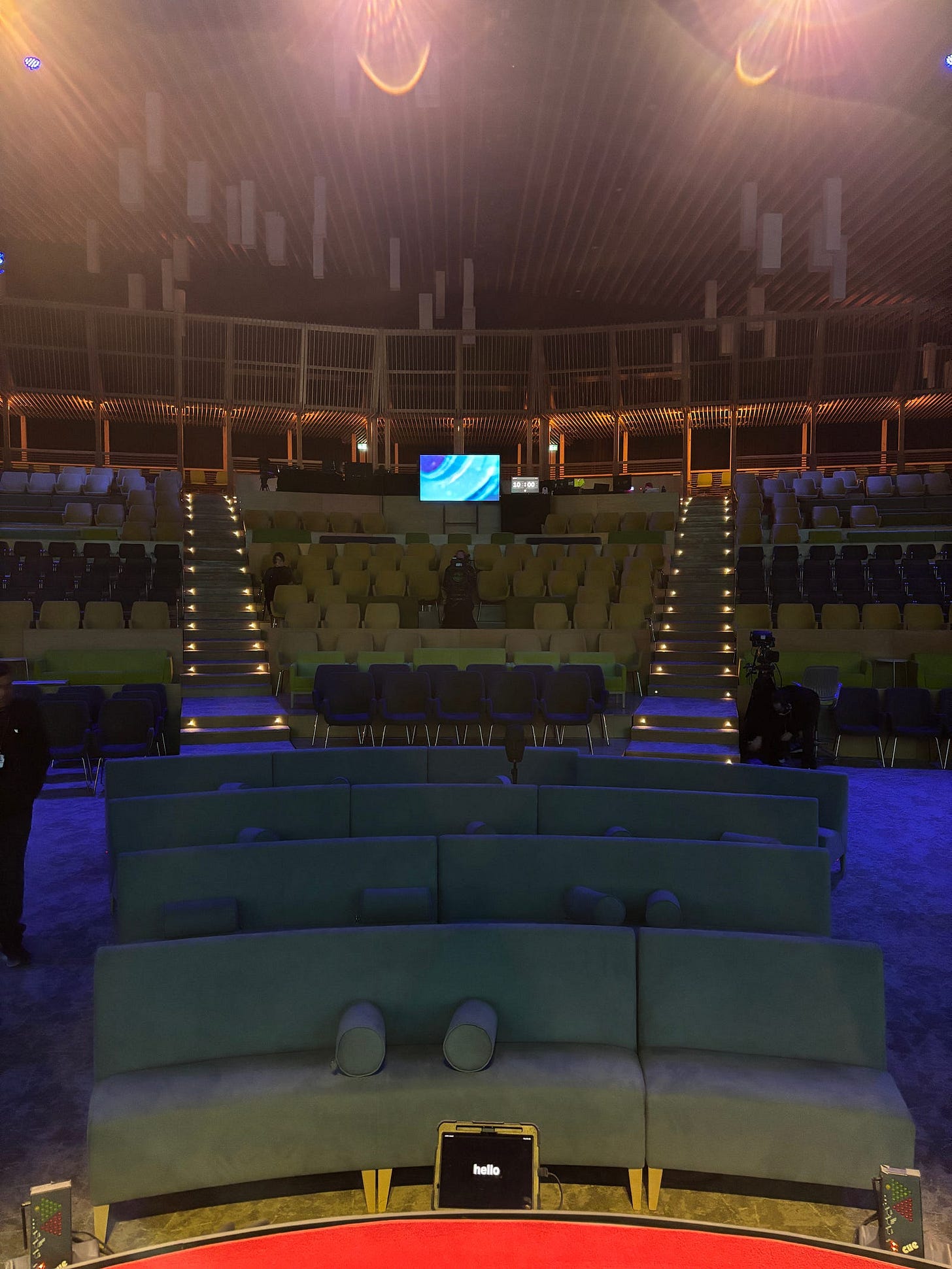
Throughout the day I kept going on stage in between other people’s practice sessions to get comfortable with it. I wanted it to feel like home, “this stage was going to be mine”. I paced around on stage, feeling the hardness of the ground, the distance to each corner, I wanted to know this stage like the back of my hands, and feel it in my bones.
The rest of the evening, I just started hanging out with the TED staff in the audience seating area, watching them prep the stage, and other speakers rehearse. It had a great vibe, I felt much more comfortable with the staff. They’d share a lot about the history of TED, the previous cities it was held at, and the early days of TED and how it grew. Meanwhile, the staff were running through a preview of how the week would play out, all the intros and special sets required for certain talks. I was getting the backstage look. I was so excited, I couldn’t stop smiling.
The final rehearsal
Each speaker gets one full rehearsal on the main stage for the finishing touches. The first thing I realized with my outfit I chose…it doesn’t work! TED said the coarse texture, and repeated pattern of my favorite sweater was having a strange blurring effect on camera (like aliasing). Rats. I had to figure out a new outfit for the actual day.
Anyways, as I get on stage, there are about 30 people in the audience, mostly staff, and some other TED speakers. I deliver it pretty well actually, I felt pretty good! I had longer pauses during key lines, just because the large stage felt like it demanded it. I did fumble the very last line, somewhat the most critical. Didn’t stick the landing. Ha!
Afterwards, Briar mentioned that I was a great speaker. That felt wonderful, because she herself is an incredible communicator. She did mention that I was 1 minute over, and that I did need to cut something, potentially the ending. However, I loved the ending! In practice I was usually on time, but I mentioned that the stage probably made me forget some of my lines. So over the next 2 days, I practiced the hell out of my talk.
One hiccup though were my slides. TED offers sprucing up your slides to be more professional. However, they were still finalizing them, adding animations, and just had a ton of back and forth, finalizing the dynamics of them, like the transitions, the animations clicks, and the timing. They looked beautiful, but I was preparing to use my crappy personal slides that I made because the iteration time was too long, and I didn’t want to have a slide deck malfunction on stage. It was stressing me out.
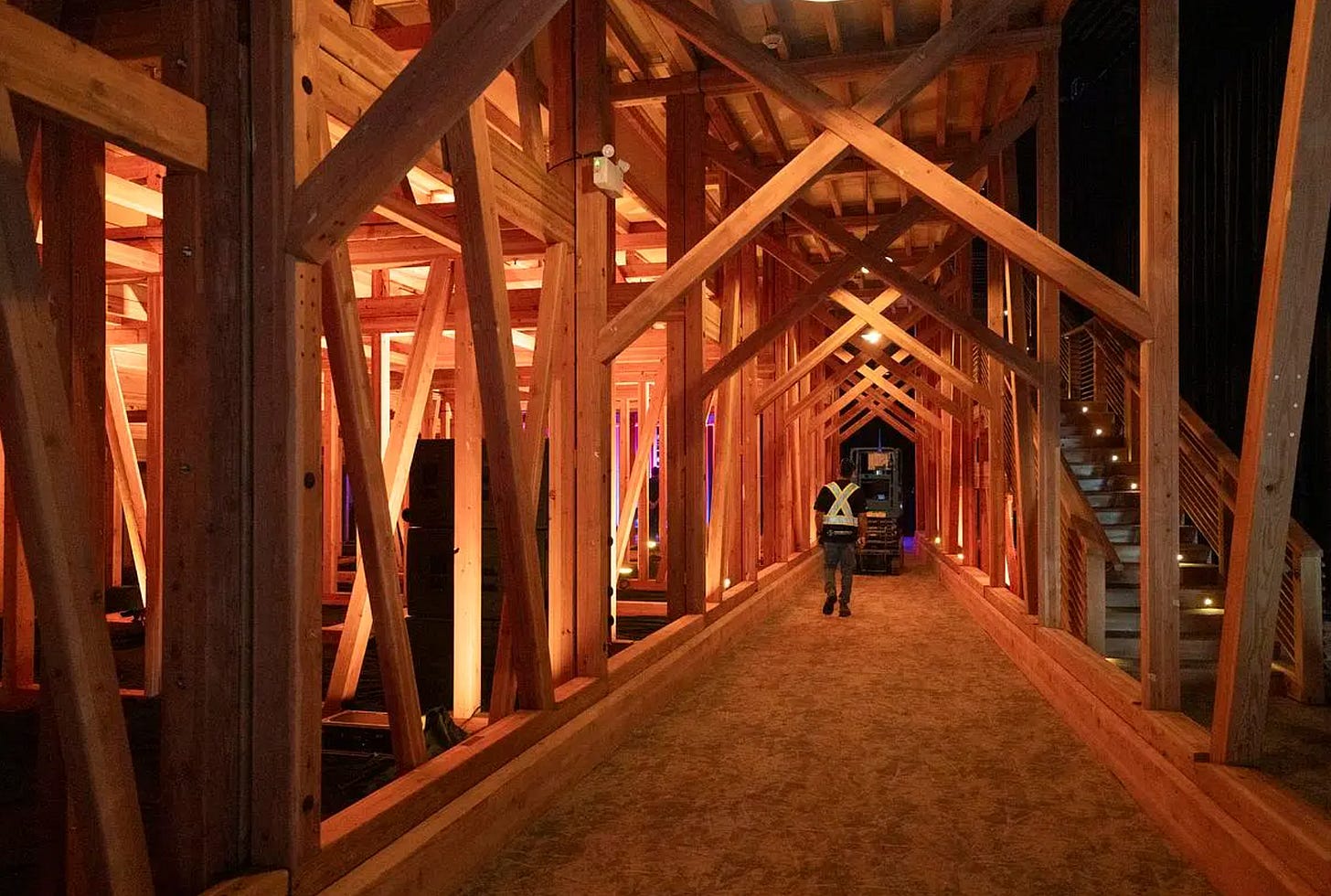
But overall, I wasn’t that anxious. Leading up to my talk day, in the middle of the week, I was able to sit in on the other talks and actually listen, which I’m super thankful for. After all, I was just as excited as other audience members to hear the talks!
Summer camp for nerds
The entire vibe of TED is simply magical. Imagine a giant summer camp for adults and self-proclaimed nerds, with an air of big tech campus perks. Free food, drinks and snacks within sight at all times. And most importantly, an eagerness to learn and network. Because of the insane price tag, many of the attendees are pretty high-level at their day jobs, c-suites, founders, or influencers of some sort. The really nice part — everyone there wants the speaker to succeed. They know you’re about to share your life’s work, prepared to give a very big talk, all for them to learn from. They’re so appreciative of your “gift”. They’re on your side. You can feel it in the whole conference center.
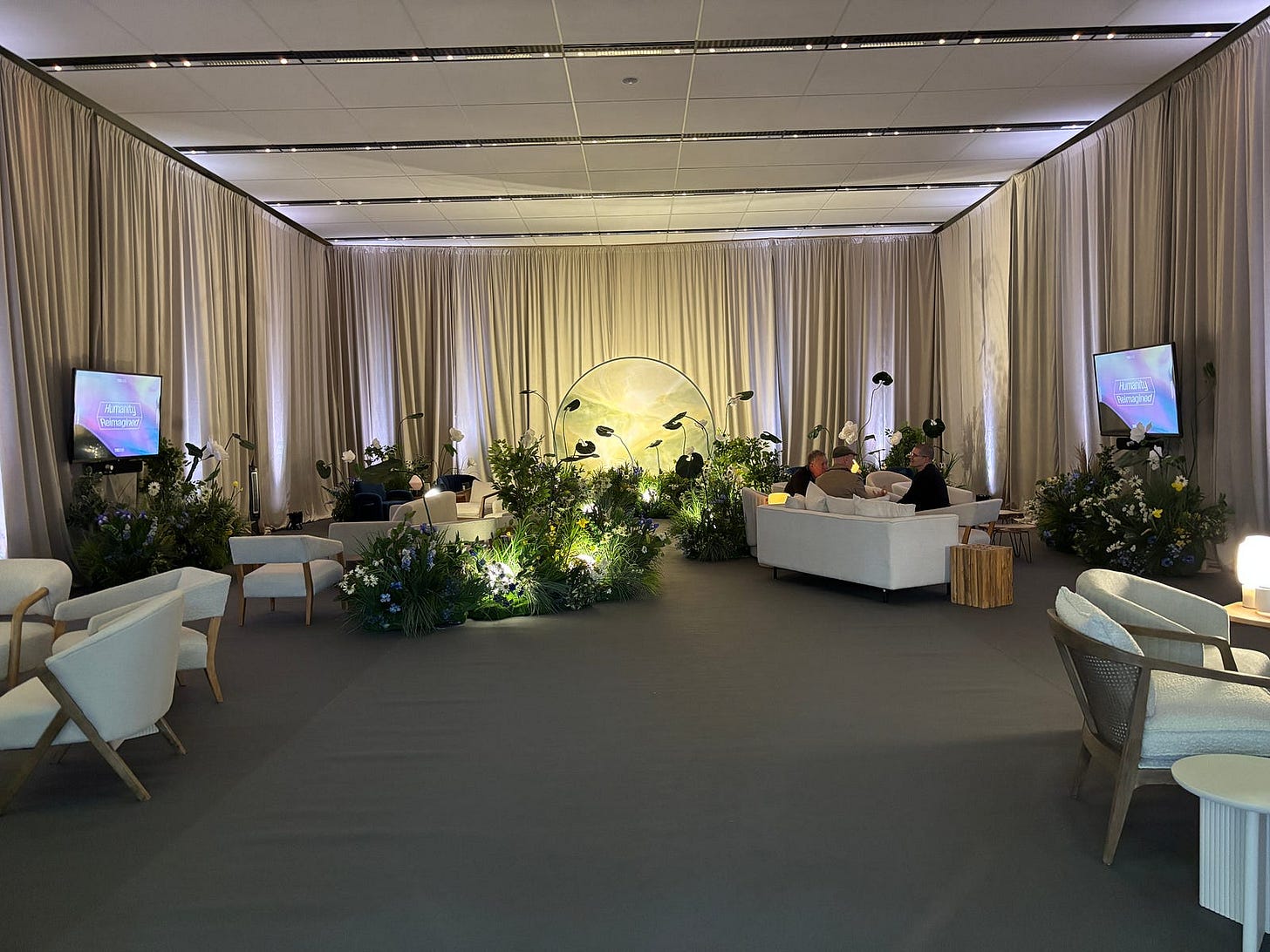
An extremely awesome perk is the treatment as a speaker. All the TED staff makes sure we’re taken care, always being positive, saying hello — it’s like a mini-celebrity treatment. Being greeted by staff, showing me around the different spaces. A speaker lounge with food, meant to be a calm getaway from the bustle of the conference.
And when other attendees see you’re a speaker (based on your badge), then they perk up and shower you with attention. It’s like being the attractive person at a dinner party (so I hear).
When I recognize some of the other speakers, it’s so fun to meet them and chat about how they’re feeling. By far the best part is getting to hear their journey. Their inspiring stories. What they’re excited about, what brought them to TED, how they’ve been preparing. And also, we get to have a shared experience together. We’ve all been in our own heads for months (in my case 4), crafting this story we want to tell. Stressing so much and for so long on a short talk. Then we’re thrown together and realize that everyone else has had this similar journey. We now get to support each other, and root for each other. The TED family environment is a thing, and I drank the entire kool-aid.
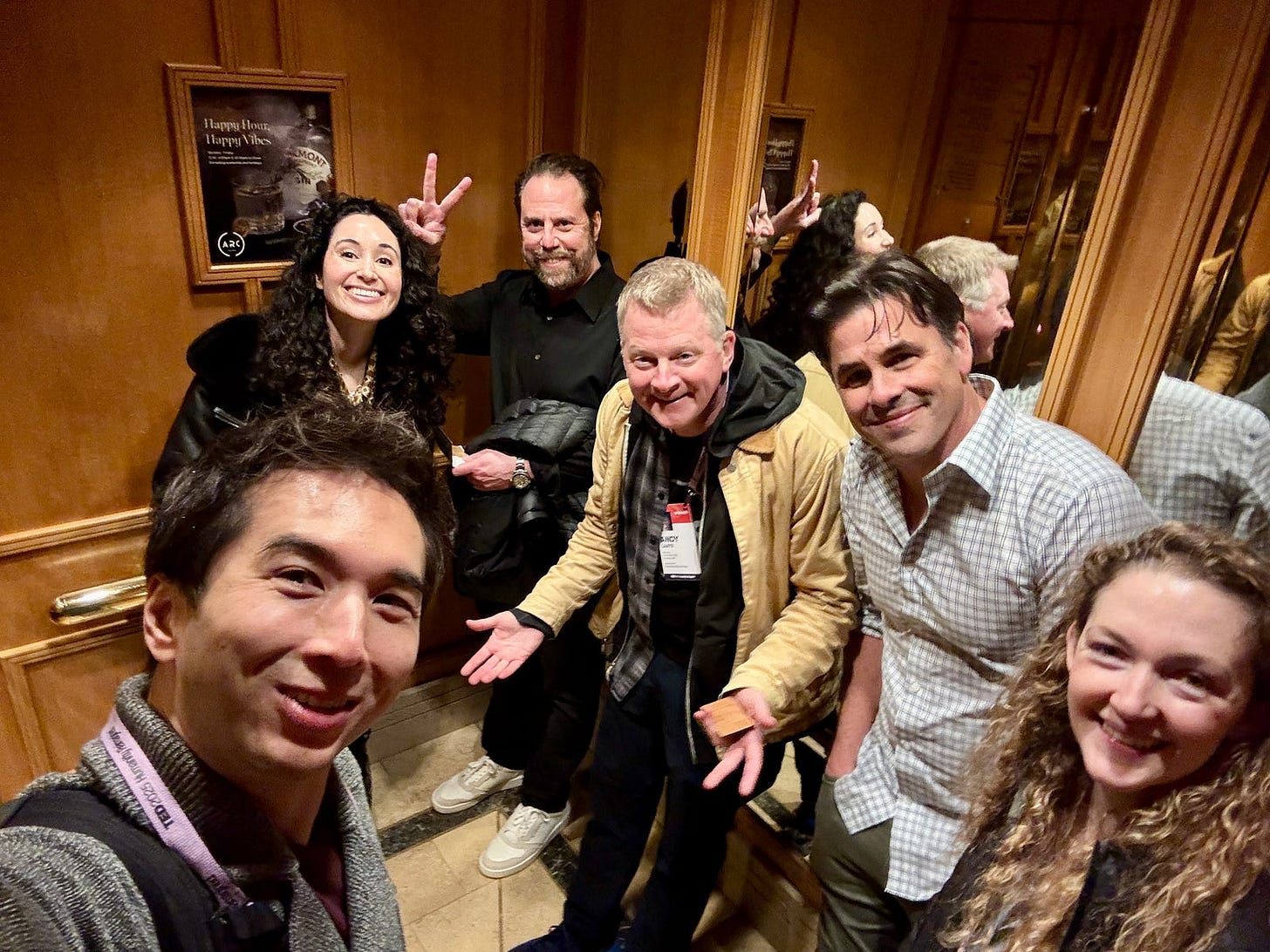
The first thing we usually ask each other is which day our talk is. Those earlier in the week were the lucky ones. Imagine being on the last day. How would you be able to concentrate on other people’s talks all week? Would you try to make last minute changes after seeing someone else’s amazing talk, and stage presence? Being in the middle of the week, I think that was pretty lucky.
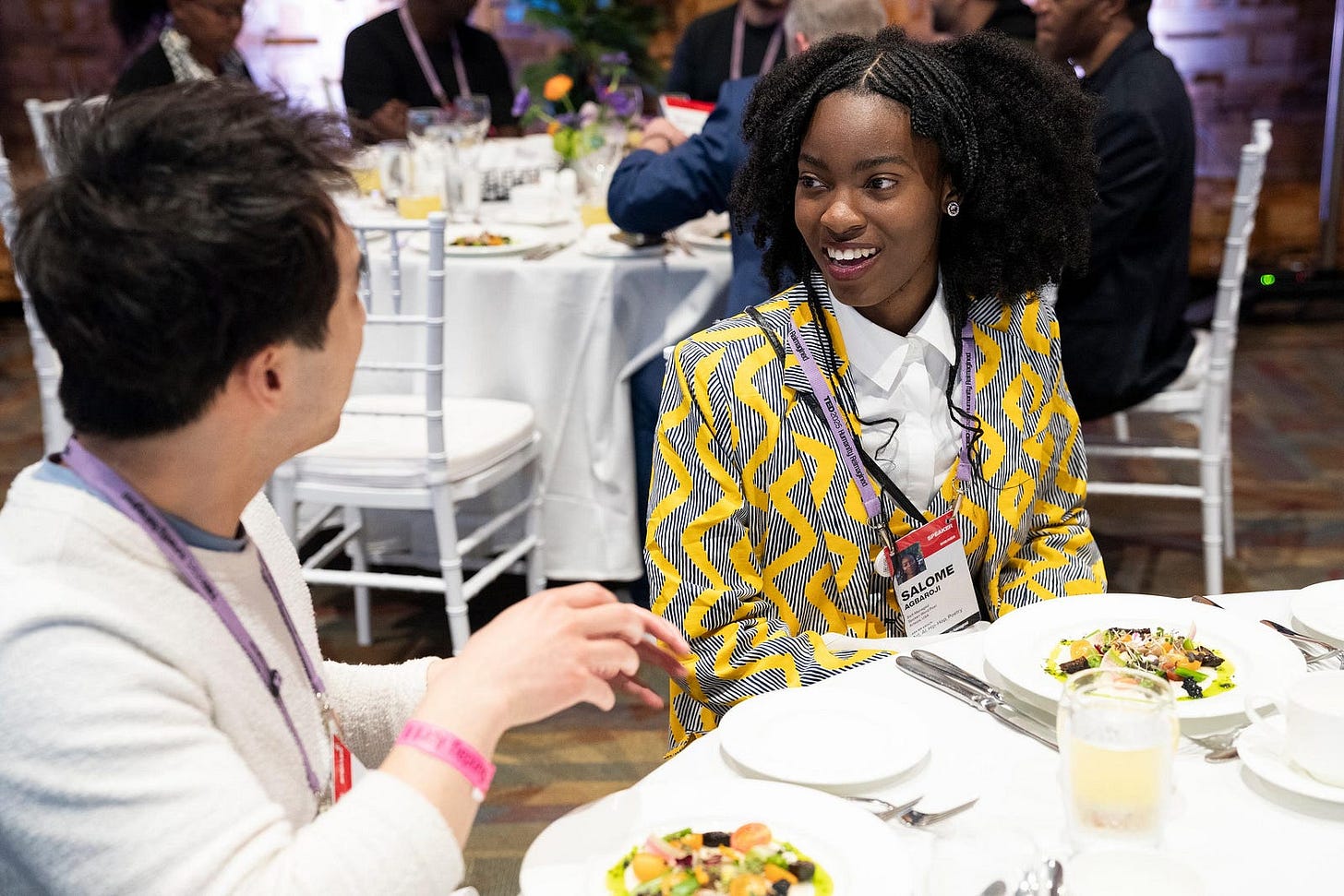
On the day before the official start, TED held a speakers dinner, where I got to meet Salome Agbaroji. She was the youngest person at TED, 19, and a sophomore at Harvard. A national youth poet laureate, the 7th, which I wasn’t even sure what that meant, and had to ask her what it meant. It meant she was a badass.
Earlier that day, we had a speaker’s welcome lunch where I got to sit next to the legend, Yoshua Bengio, the grandfather of AI. We were on some papers together (through a friend), but I never actually met him. I was hoping he remembered me, but did not. He was right on brand though, evangelizing the dangers of AI. He struck up a deep conversation with an anthropologist TED speaker about parenting. Turns out, his mission now was to bring about safer AI for his children, and future generations. I don’t agree with his AI doomer-ism, but it is coming from a good place.
Day 1 — opening night
What you don’t see online for TED videos is the chronology of the talks. They really do curate the topics, and have you watch them in a certain lineup, with some intros beforehand. Overall, what’s different is that it’s actually an emotional roller coaster itself, because the topics can be heavy, and jump back and forth in seriousness, awe factor, inspiration, ie, basically every human emotion.
I could write a separate blog for all the talks themselves, but that’d be impossible. Instead, I will share some key moments for me.
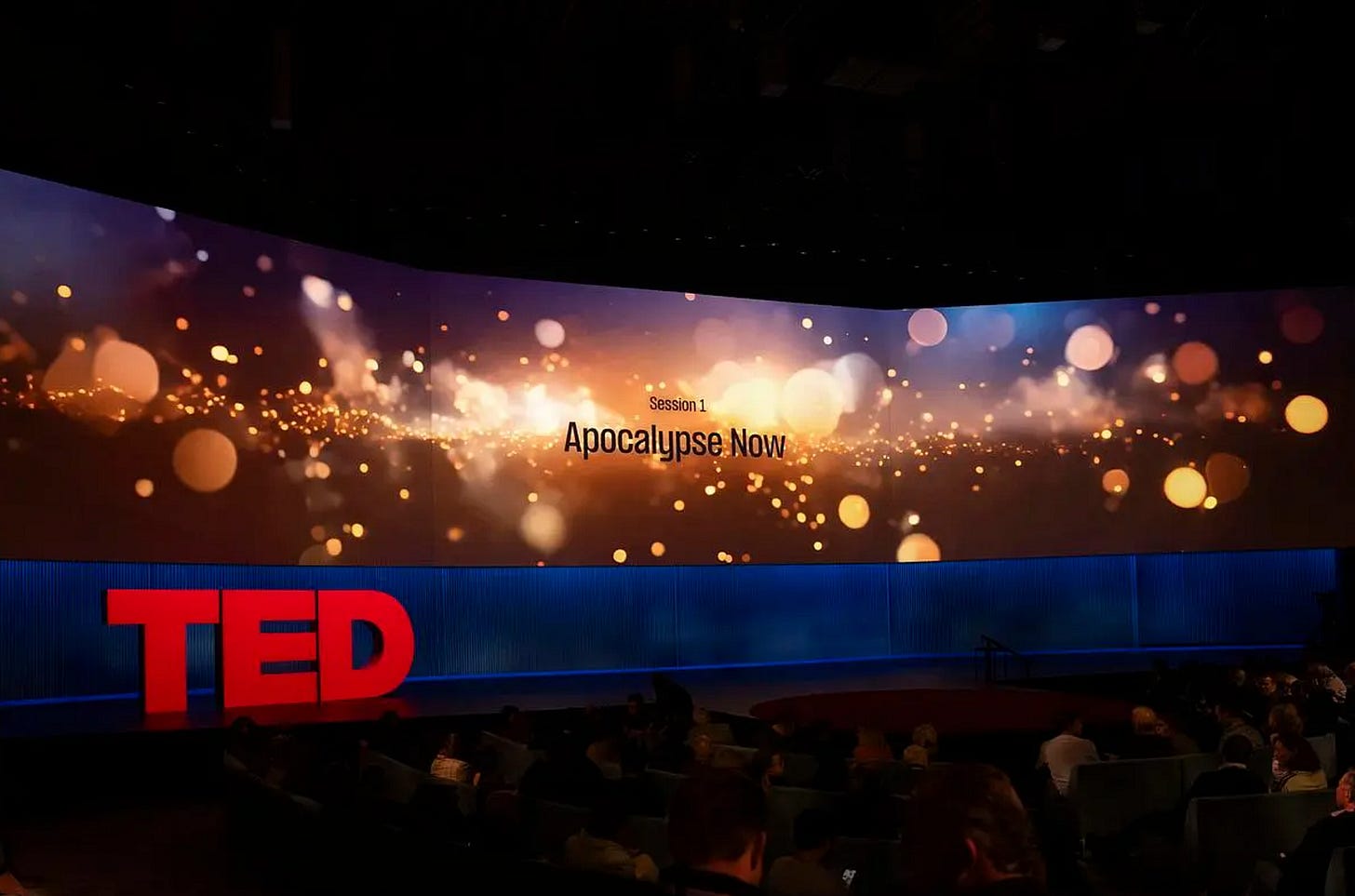
Opening night was delivered by Carole Cadwalladr. Hands down, my hero of the entire week. She previously broke the Cambridge Analytica story from Facebook. She set the somewhat darker tone of this year’s TED, with its modern critiques of AI, privacy and the rising power of tech and politics. Here’s her talk, entitled, “This is what a digital coup looks like”.
It hit so hard. And it wasn’t even because I necessarily agreed with her opinions so strongly. It was a simultaneous display of vulnerability and bravery at the same time. I was incredibly moved, captivated. I don’t know how one pulls that off. She had so much guts, I wish I and everyone could respond the same way she did against the ultra powerful. I have the softest spot for those who can stand up against the powerful, and fight the good fight.
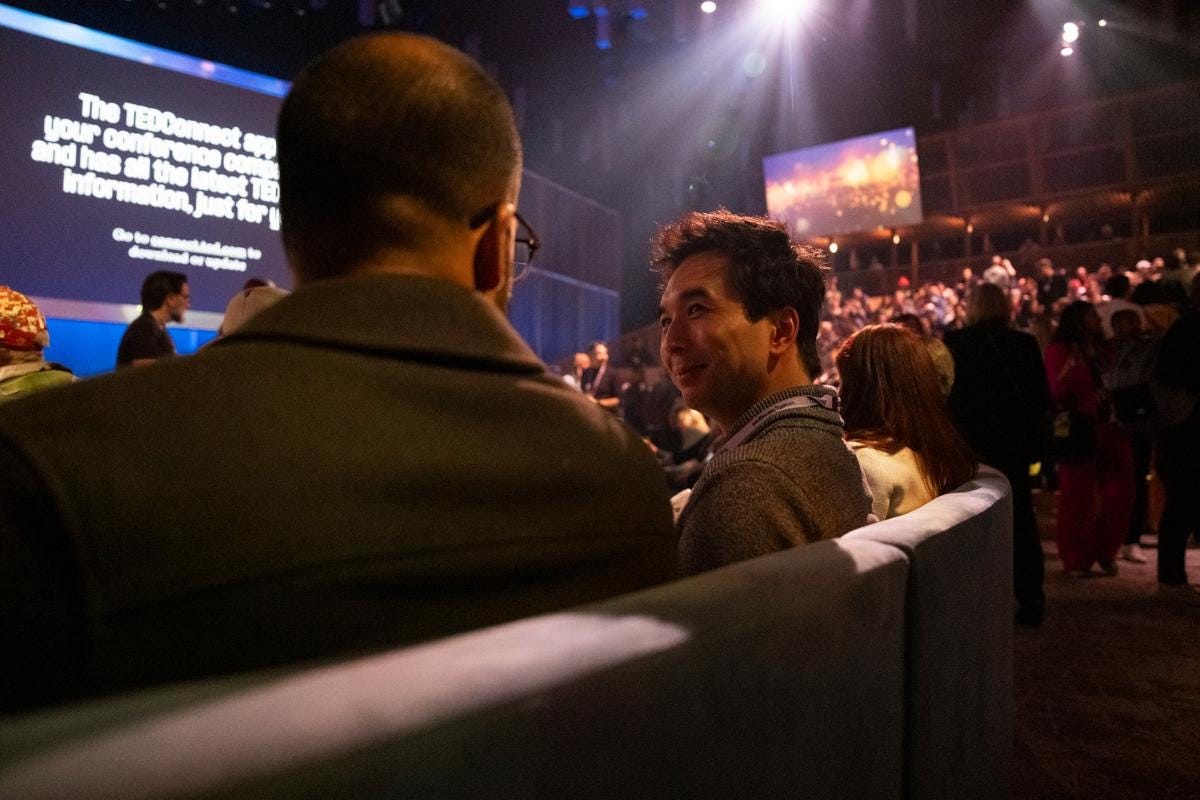
Conference besties
I made a few “besties” at the conference. Nothing beats the feeling of getting to support your fellow speakers at TED, they’re your teammates, who happen to be world experts and movers in their areas, and phenomenal communicators and story tellers. The lunches, dinners, and post evening events are incredible chances to just talk to them as regular humans.
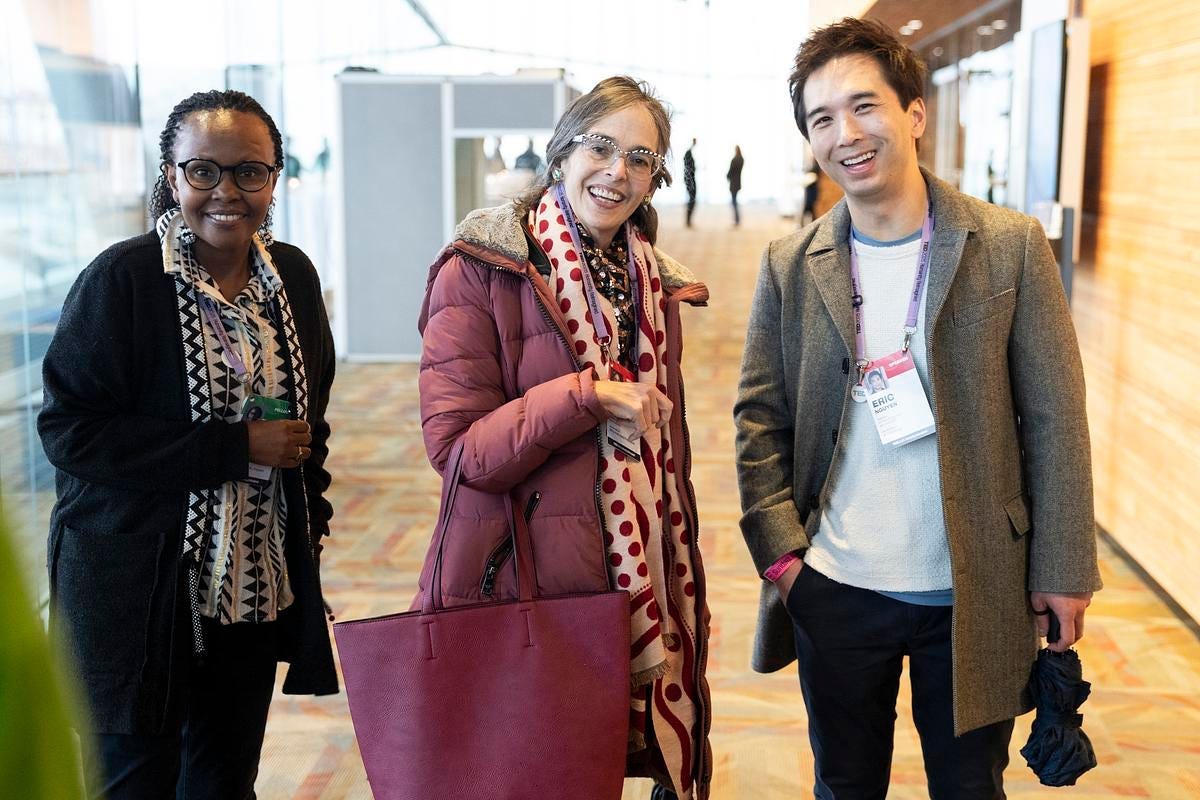
Lenore Skenazy is like the friend I always had, but never met until now. She’s known for “Free-range Kids”, supporting the idea of being more hands off in parenting to give them space, downtime, and just let them learn for themselves, and just be themselves. Her talk was charming as hell, the funniest talk of the whole week for me.
Quick-witted, warm, able to strike up a conversation with literally anyone. Throughout the week, whenever I saw her I’d yell out, “Lenore!!!” and just come rushing over with a big smile. I love this woman. Occasionally she still texts me and asks, “still creating new life forms?” Which will make more sense after watching my talk.
One funny conversation I had with Lenore — I tell her how hands off my parents were when I was a kid. To the point where I wanted more supervision. When I was in middle school, around 12, I’d get to stay out until 2am or so, without them knowing where I was. She said, “well that’s extreme, your parents should know that”. The promoter of free-range kids, thinking that even I had too much free-range as a kid. It’s something I always suspected, and now it was certified by the leading expert. Interesting.
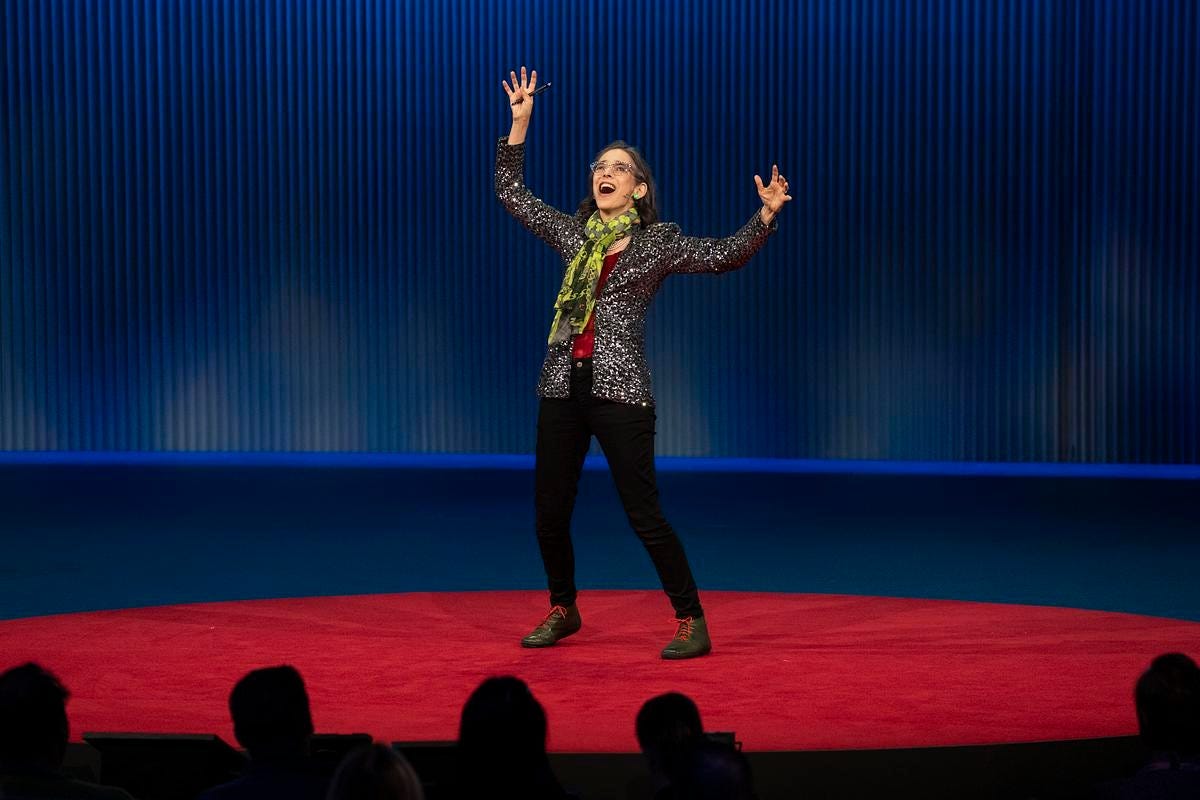
The front rows are reserved for big donors, they get first dibs on seats. But also, the fellow speakers get to go in early to grab seats too, which was an incredible privilege. Of course I’m sitting in the front every time to root for my home team.
In the evening, during the “I, Robot” session, which basically turned into an AI technocratic dystopian kind of vibe, Salome gave her spoken poetry talk on the current AI and society merging. So powerful, so beautiful. She had the stage presence of a veteran, an artist, and yet, she was the youngest of all the speakers. We have each other’s back during the week, experiencing this thing together. She’s going to take the world by storm.
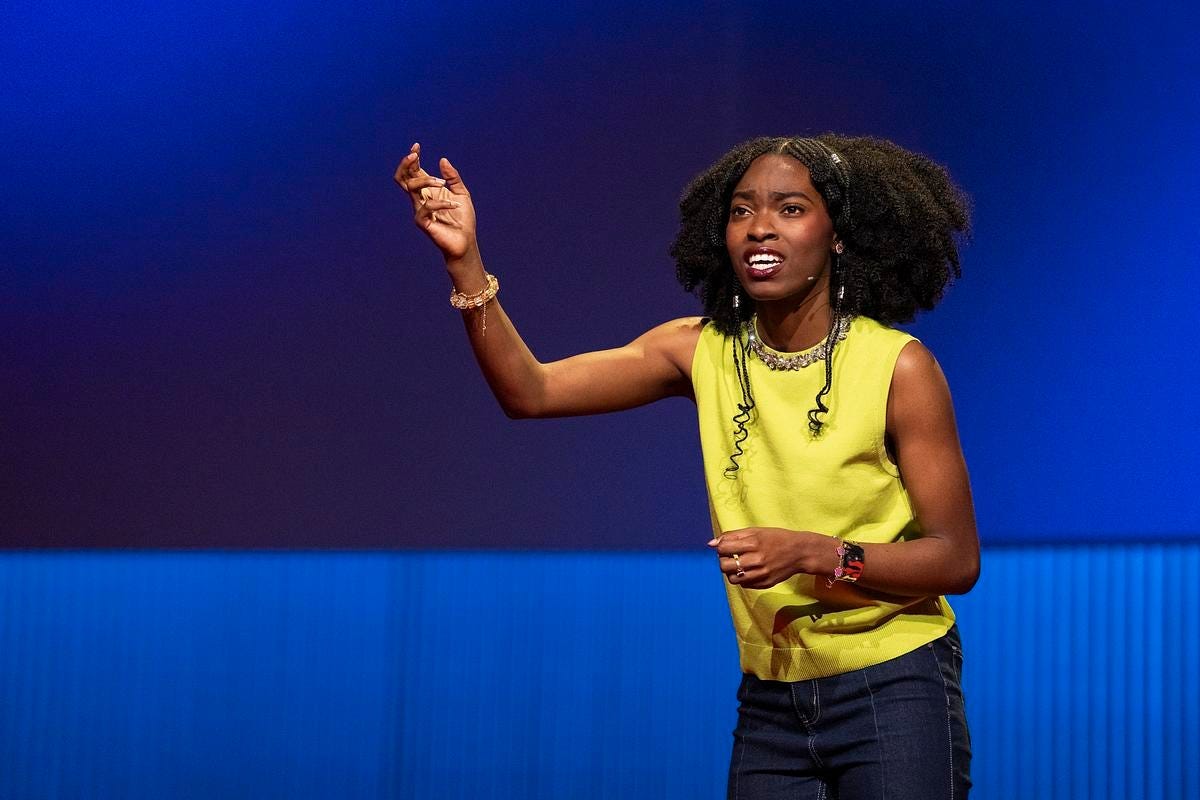
My 12 minutes on stage
My talk day was here.
The first fire to put out, and most important issue of the day? What was I going to wear? My outfit got vetoed so I was scrambling to find something else. I had a blazer as a backup, but it looked plain. I asked to get a handkerchief, something to pop, and Lenore had the TED staff go find something, apparently it was $155 CAD! Phewy. But I thought it was perfect.
My PhD lab mate Michael Poli (co-author of Evo) also flew out to TED to support me, which was wonderful of him. The morning of, Michael heard me practice, and I felt good. I got the final set of slides in, just a few hours before. Crazy last minute! Then I had to practice with them to get the timing right. Some slides required 2 clicks, others just 1 to get the animation going. I was worried I was going to be off… and not be able to concentrate on the audience. But they looked much cooler than my personal slides.
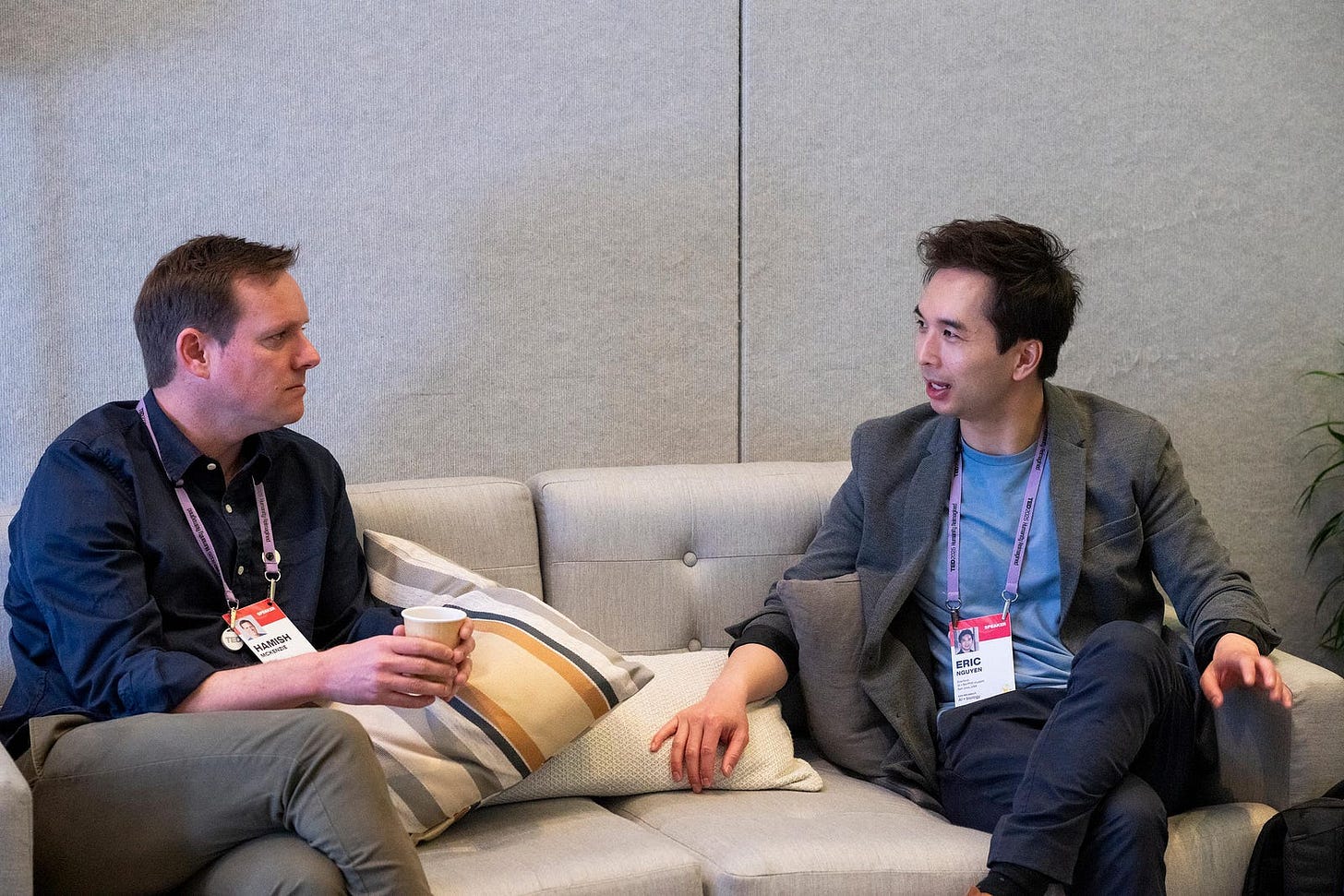
I felt very ready. I kept talking to myself, repeating key lines. I felt good, looked good (in my head). All I had to do was wait in the speaker hub backstage, and chill out with the other speakers. They were all in the same mode, eagerly awaiting. Some opted to sit by themselves, and be silent, while I on the other hand had all this nervous energy I needed to dispel and so I was chatting with everyone. The founder of SubStack, Hamish McKenzie, was right after me, and I got a chance to talk to him. Normally I’d be gushing just to talk to him about his journey, but you can’t fanboy over every person you meet, you got to choose your battles.
I got moved into a different session called “Wild at Heart”. For our session, there were 8 speakers, with myself second on bat, after Gabe Whaley. When Gabe went on he was on fire! The audience was laughing up a storm about his new company aimed at culturally subversive art (kind of like trolling social commentary). One project, he put holy water in the soles of AirJordans and sold thousands of them. Literally “walking on water”, like Jesus, as they say. Thank you for the warm up Gabe! Though, I knew I was going to change the mood very quickly with my topic.
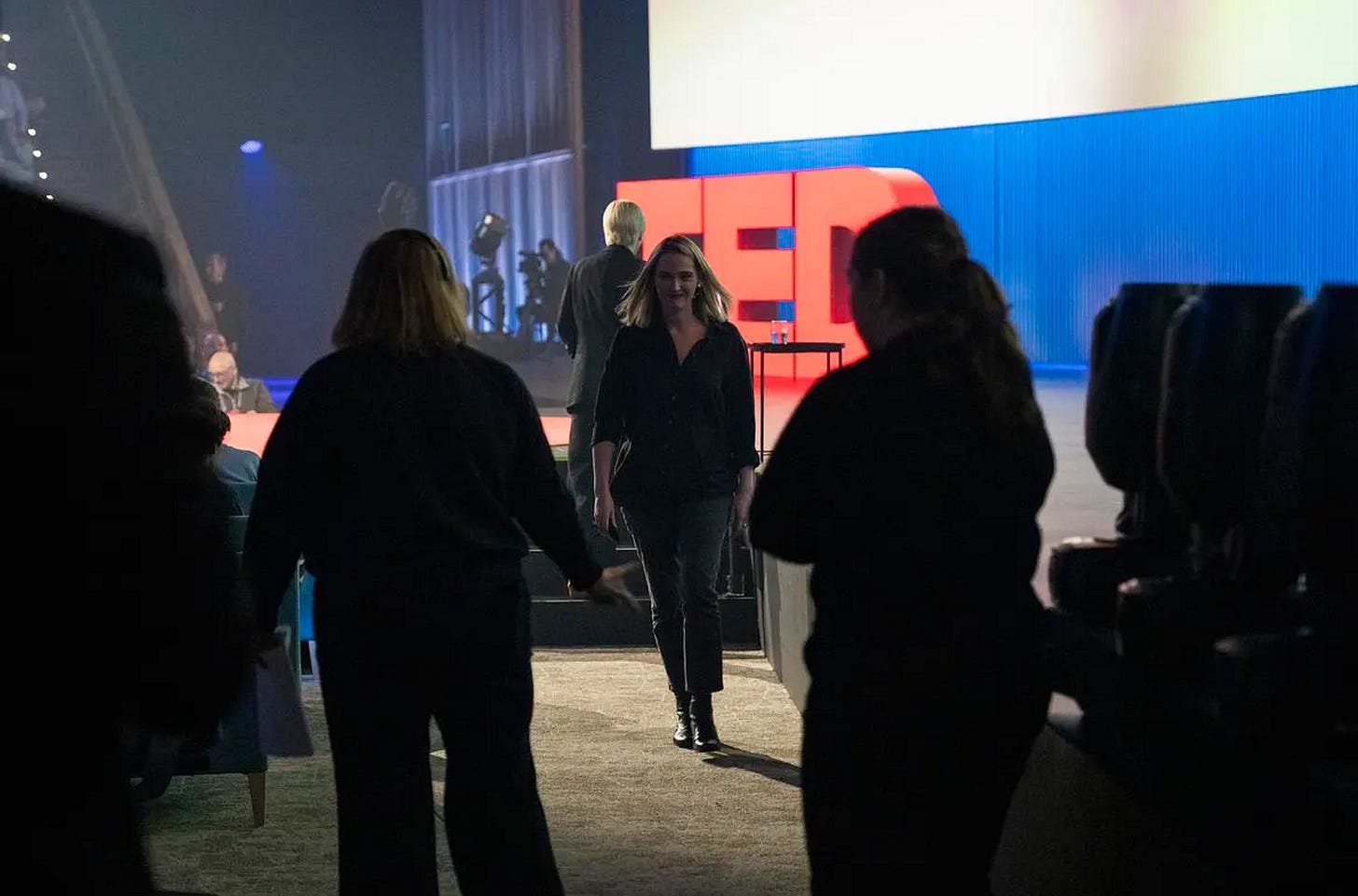
Gabe’s talk ends, and I stand on the side of the stage waiting for my cue. Cue the introduction and music. I start walking up the steps to the stage, and see a large crowd in the dimly lit room. The familiar warmth of the lights shine down on me. This time, I’m ready.
During the actual talk — I felt good, natural. Part way through, in the middle, I felt locked in with the audience, that they were engaged, and I had their complete attention. The words just kept flowing out of me, but I don’t know quite how. Sort of like an out of body experience.
I see occasional friendly faces in the audiences, but make sure to spread the love (eye contact) all over the audience. I had a lot of dramatic pauses during my talk, and I do remember hearing a lot of silence from the audience. In my head I was thinking, either I have them totally locked in and scared, or they’re bored.
And then, just like that, it was over.
I remembered sometimes the audience would give standing ovations for the really cool and fun talks. But at the end of my talk, when I saw no one really do a standing ovation, I thought to myself, “ah crap, they must’ve been bored”.
But that’s ok, I was done. I gave what I thought was my best performance, even better than all my practice runs. It was pretty flawless, I initially thought.
Stage euphoria
As I walked off stage, I was greeted by Briar and Whitney, my TED team, and they were telling me it was great! The smiles were all big, everyone congratulating me. I felt euphoric, and remember thinking, “Did that just happen? Where am I?” A rush of endorphins, dopamine, flooded my brain. I was on cloud 9.
I walk backstage to the speaker hub, and I’m greeted by the other speakers in my session. They were so happy for me! Alice Evans, a fellow speaker, was so kind, saying she thought it was fantastic, and went into detail about how effective my delivery was, my expressions, my intonations. Those words meant so much to me, as she herself had such an amazing stage presence. I felt so lucky to come back to such a supportive room.
The SubStack founder was right after me, and when he came backstage, he mentioned that it was tough to follow my talk (in a jovial praise). I didn’t quite listen to his talk, my head was all over the place. But it was flattering. After I calmed down a bit, I went back into the audience and listened to the other speakers. I could actually relax now!
After each session is a “meet and greet” with the speakers, and so I show up to mine. I had a number of biology folks approach and chat. I tried to field their questions as best as I could, sometimes it was pretty bio heavy and speculative, or specific to their field. I just guessed. I honestly had so much adrenaline in me I’m not even sure what I said to them.
“A scientist shouldn’t be this good”
What did I feel like doing after the talk? I just wanted to roam the halls of the conference, talking to people. That was one of my favorite things. I liked running into friendly faces and sparking up a chat. Oftentimes I’d run into another speaker, and then we’d chat in place, or just roam the halls together, that was my fave too.
I found Lei Chang, who closed out our shared session. Her talk was incredible… so powerful. She had the most brave, and harrowing story out of everyone at TED this year. She was a journalist that was falsely imprisoned in China after being accused of espionage. She spent 3 years in a Chinese prison, with various tortures.
When I got to talk to her personally, it was one of my favorite memories. To see such a powerful talk, and then how regular a human she was, it’s a great reminder of how similar we all are at our core, and yet, how different we are, or what experiences we can have. I enjoyed hearing about her personal life, re-entering civilian life, with family and friends. I was amazed at the ease she could interweave both tragedy and comedy, being able to find humor and irony in her experiences. I wasn’t sure if it was ok to laugh at many points, but she did, so I didn’t feel put in an awkward position or anything, just truly in awe and admiration. “I wish I could have this person in my life”, was what I was thinking.
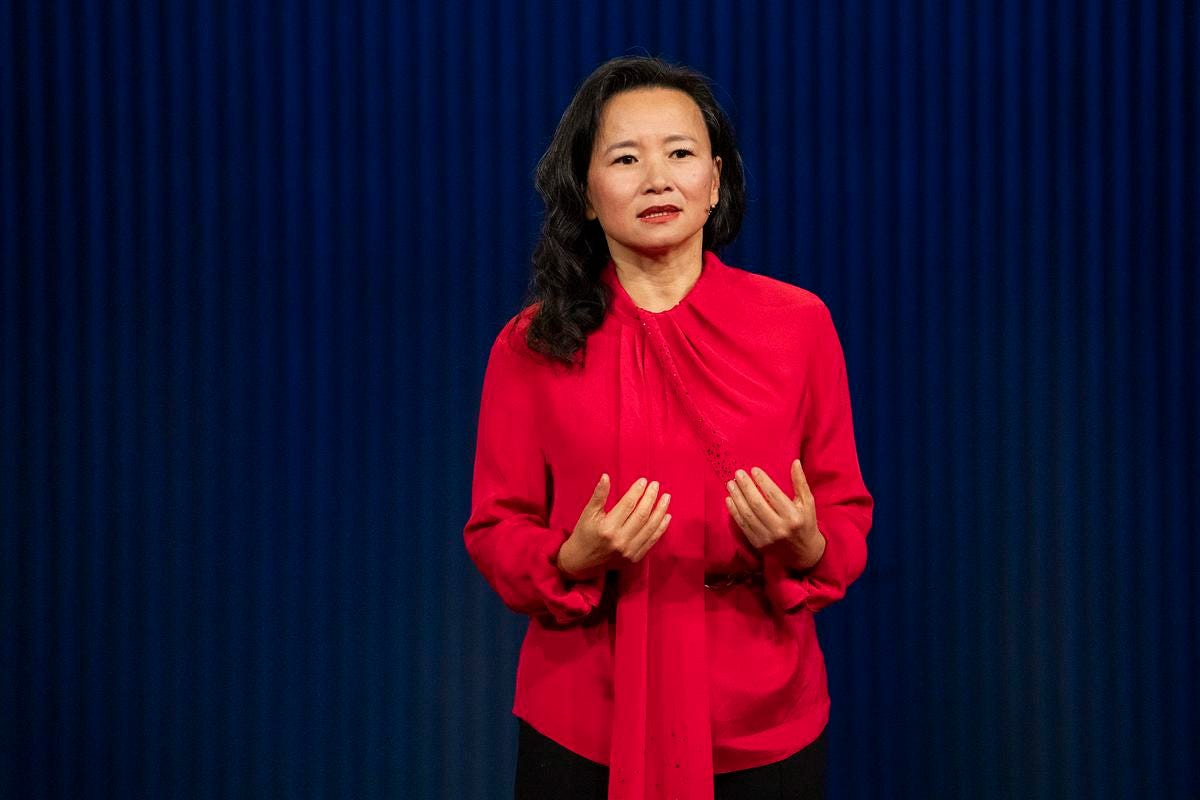
That was a recurring theme in general, so many people at TED, I wish I could have them in my life in general. What does that say about TED? What does that say about me?
I continued walking around the conference. Dozens of people came up to me and would say the same thing about my own talk, “fascinating, but terrifying” talk. I tried walking the line carefully, trying to balance the engaging and cool science factor, with the “scariness” factor. I was going for maybe a 40–60 mix, being ok with the idea that fear can help folks engage with the topic. But when I realized it was like 100% all terrified — I think I went too far.
One audience member mentioned that my talk had created some buzz immediately afterwards. Others would just interject and say, “scary talk”, to me, as they walked by, or when in line with me. Yijia Tu, another speaker, said, “I didn’t know Eric was so serious.” Trust me, he didn’t know either.
Angus Hervey, an Australian journalist and fellow TED speaker, said it was one of his favorite talks. He described my talk as having both scientific intrigue mixed with a dramatic, big idea. He had heard about Evo before, but didn’t realize the ambition of the project as told during my talk. I guess the dramatized version of the story came through.
My favorite thing Angus said to me was, “a scientist shouldn’t be this good”. I could just die happy after hearing that.
I did proceed to mention how much effort I put in and help I had, including 2 content and personal speaking coaches. He said, “ah, now that makes sense”.
What he said especially meant a lot to me because his talk was one of my favorites too. It was dramatic, beautiful, simply perfection. Coolness just oozed from him. It inspired me to want to craft storytelling as well as him.
The comedown: “I’m a fraud, that was terrible”
As some of the adrenaline started to wear off that day, I started worrying if I made the bio AI community (my field) look irresponsible, cavalier, or have too much power and that people should be worried about this kind of research. I started to think I might get “cancelled” by the biologists. That they’d say I don’t speak for them, that I was being sensational, or not a real scientist. I was beating myself up.
One dirty secret from TED is that they heavily edit the talks before posting online. Though, there are unedited recordings that TED makes available to conference attendees. I get home quite late that day, from the evening events, and when I finally hear what I sounded like, my jaw dropped.
I spoke far faster, and more “jerky” and less smooth than I originally thought. I had a pretty decent freak out moment. I stayed up for another hour (until 4am) just rewatching my talk, in disbelief of my delivery. I kept hoping that it would change each time I’d rewatch it.
I started sending texts to friends, freaking out. I was hoping to hear encouraging words from them. Luckily Kayla was still up and said to not worry. “We’re our own worst critic,” and to give it a few days. Logically I knew she was right (she always is), but emotionally, I couldn’t shake it.
The next day, I had trouble listening to the other talks. I was still thinking about my own performance. I recited the talk in my head, thinking, wishing I said things differently, more slowly, more articulate. I was far more stressed out immediately after my talk than before it! That was nuts.
One of the other speakers, Robert Green (a geneticist from Harvard), thought I delivered it perfectly, the pacing, the timing. He was very kind to me throughout TED. He was like the steady ship I could always turn to, cool as a cucumber. He said, “You’re a young guy, you got a whole career ahead of yourself, don’t worry”. I thought to myself — “I’m not that young, but I get your point”. :)
It wasn’t until the last day, when I talked to Angus, the amazing journalist with the perfect talk, that I turned the corner. When he described his own journey, I realized I was being too hard on myself. He had given several TED talks before (I think 7???), and said there is a “comedown” period. “One moment you’re so high, feeling on top of the world, the next, you’re feeling like shit. I’m a fraud, that was terrible, people will hate me, etc.” He said, “you need to be kind to yourself the week after”. I needed to hear that 100%. I felt all of that.
For the next several weeks, I keep rewatching my talk, reciting the talk in my head, to perfect it. It was just a habit at this point. The day didn’t feel right or complete unless I said it right in my own head. Each passing week, I recited it less often, rewatching my own talk every few days. Occasionally hoping I said one line differently, or that I was more animated. At this point, a few months out, I am quite happy with how things turned out, and proud of the finished product.
Quack, quack
I didn’t know what to expect from TED. I still don’t.
I got a lot of comments from friends and family throughout the journey, excitement, praise, which were all wonderful and rewarding. One thing that stood out was the comment from some that, well, “you’re done”, you’ve reached the pinnacle of your career. Or “you can go anywhere you want,” (for work).
As privileged as I felt to get to do this talk at TED, by no means do I feel “done”. I felt many things, including expectations being raised — “would I be able to ever meet those expectations?” And at the same time, not much actually changed.
After TED, I was still looking for a job, trying to figure out what to do after graduating from my PhD (any moment now…). No one was handing me a job offer for doing TED. It’s just literally a talk. I didn’t save a life, or discover a cure to cancer.
I think if there’s a thing to walk away with about this TED experience, it’s that underneath the surface, we have no idea what’s going on behind the scenes for someone. There’s a term at Stanford people use called “duck syndrome”. From the outside, ducks look like they’re just swimming along, chill. But underneath, they’re actually working really hard to stay afloat. So when people see their friends all just chilling, moving along in their work, school, social lives, most people are not seeing all the hard work underneath, which makes them feel like, “why am I working so hard just to maintain things”.
So I hope that by sharing a raw, and (long) introspective piece on my experience, that I don’t just glamorize the whole thing, or share an intricate humble-brag. Instead, I hope to share it for what it was, an experience with incredible highs, happiness, but also, some lows, and a ton of hard work. Oh and a healthy dose of growth and appreciation.
What’s next for me?
One of the most rewarding things is watching the field of generative genomics blossom. Before this project, virtually no one was considering the idea of generating DNA with AI, scientists would literally tell me, “why would you do that?”
And so I thought to make this a “thing”, I would need to keep pushing it, get people excited, and evangelize. Now I occasionally get emails from students who want to push the field. Others started taking on the mission, and were even more outspoken than me. To the point where I started asking myself, if I’m not the one pushing things, then who am I? What am I doing for the world? What’s my purpose?
But I realized, and I’m still realizing, it’s not about me. Everyone’s trying to find purpose, and meaning too. If I had some small role in trying something new, and others want to take it to the next level, then hell yeah.
DNA generation is just one idea. How many more breakthrough ideas are out there, overlooked, or thought to be undoable? And that could use a different perspective, or someone curious enough to take some risks and push it forward. Maybe I could help others find more of these big ideas themselves.
So, with some of my teammates from Evo, we decided to start something new. We started a company called Radical Numerics, with the goal to enable the next generation of Evos, but not just in biology, but for any domain, science or other.
What does that mean? Well, for Evo we used AI to make DNA generation possible, but it took a huge team of PhDs to customize and design the technology. But I think AI could do our jobs better.
More concretely, I think we can build AI versions of ourselves to do this — to create AIs that know how to design better AI. Weird huh?
It won’t be easy, and I’m not even sure what that exactly looks like, but I know it can be done. We hope to share what we’re doing with folks soon, we’re still cooking.
Mic drop
So what did I take away from TED? So many things. One of them being — “it’s not about you”. As much as it seems like it’s about the speaker, and what they have to say, their big moment, etc — it’s more about your audience, in the broader sense. Yes the speaker has the privilege to talk about their idea, but the goal is to go beyond that. Inspire action, for others to take on the mantle. Encouraging others to find their big idea, what they want to contribute to the world, and then share it, gift it. Because that’s the thing about gifts — you don’t keep them. You give them away. And if you’re still feeling selfish, know that this extreme audience empathy will only help you even more.
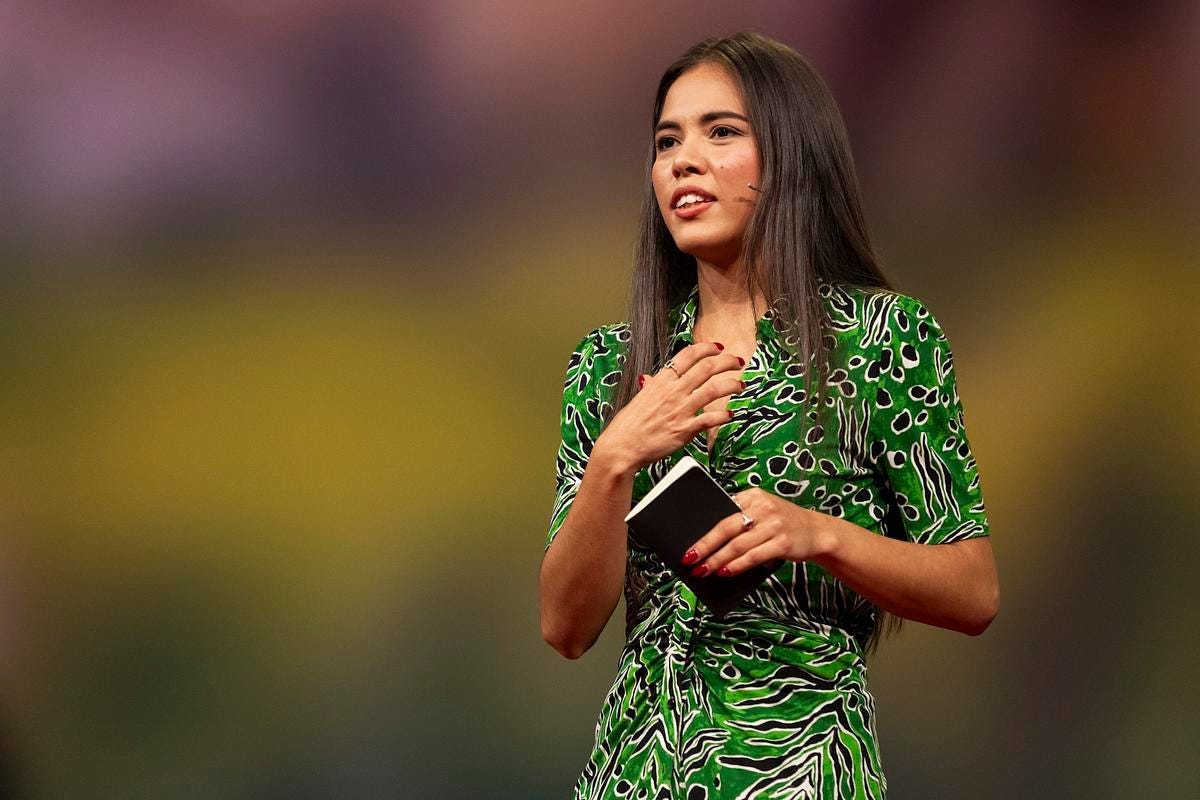
It kind of reminds me of weddings in that sense. Weddings aren’t for the bride and groom, it’s really for the friends and family to enjoy. The couple has to do all the work, make sure everyone is accommodated, stay sober (maybe), and make sure uncle and aunts don’t fight. They’re just lucky to have friends and family who want to show up for them.
Honestly, I’m the happiest when my friends, family, or colleagues say they can’t wait to share the TED talk with their friends, they’re excited to get to share something with people they know, that they feel a part of this journey with me too. Or when colleagues think to themselves, “hey ya know, maybe I can do a TED talk too?” I will move mountains to get them the same chance.
And so with that, thanks for watching my talk, and reading this blog. I’m just lucky that you even showed up.
Eric Nguyen
Watch the talk here, “How AI could generate new life-forms”
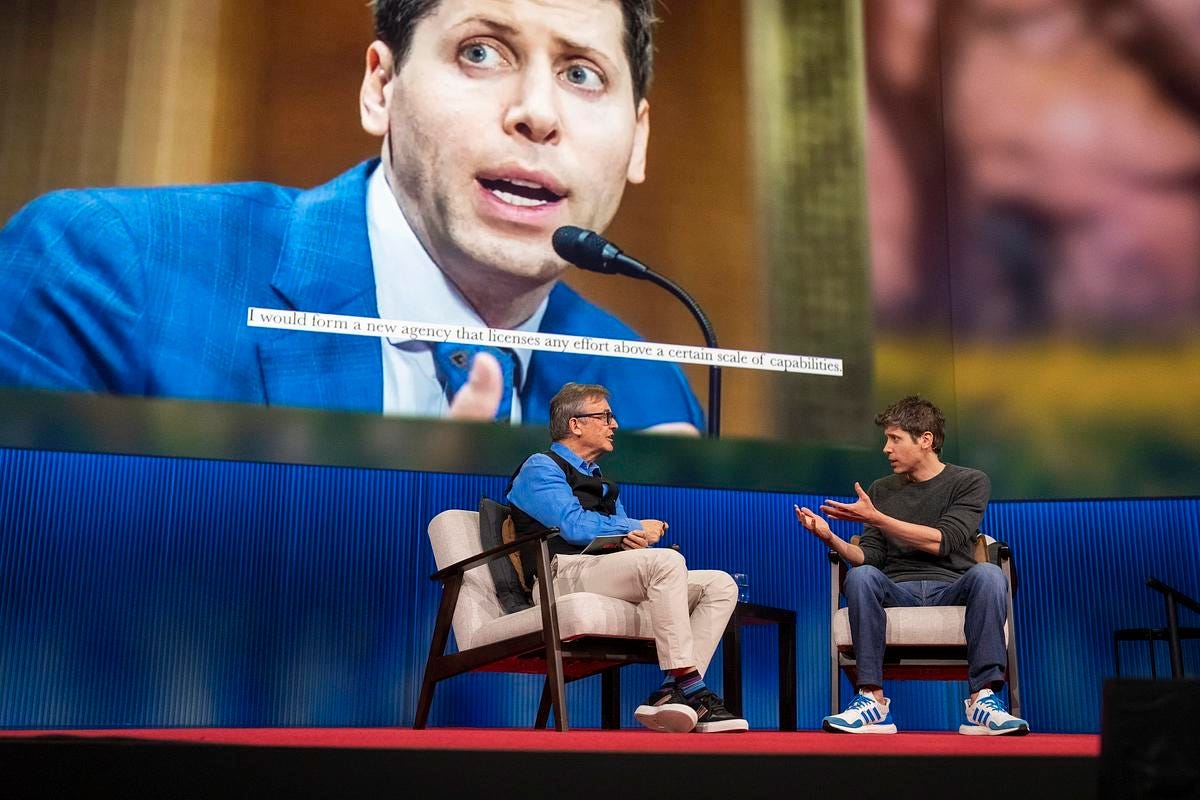


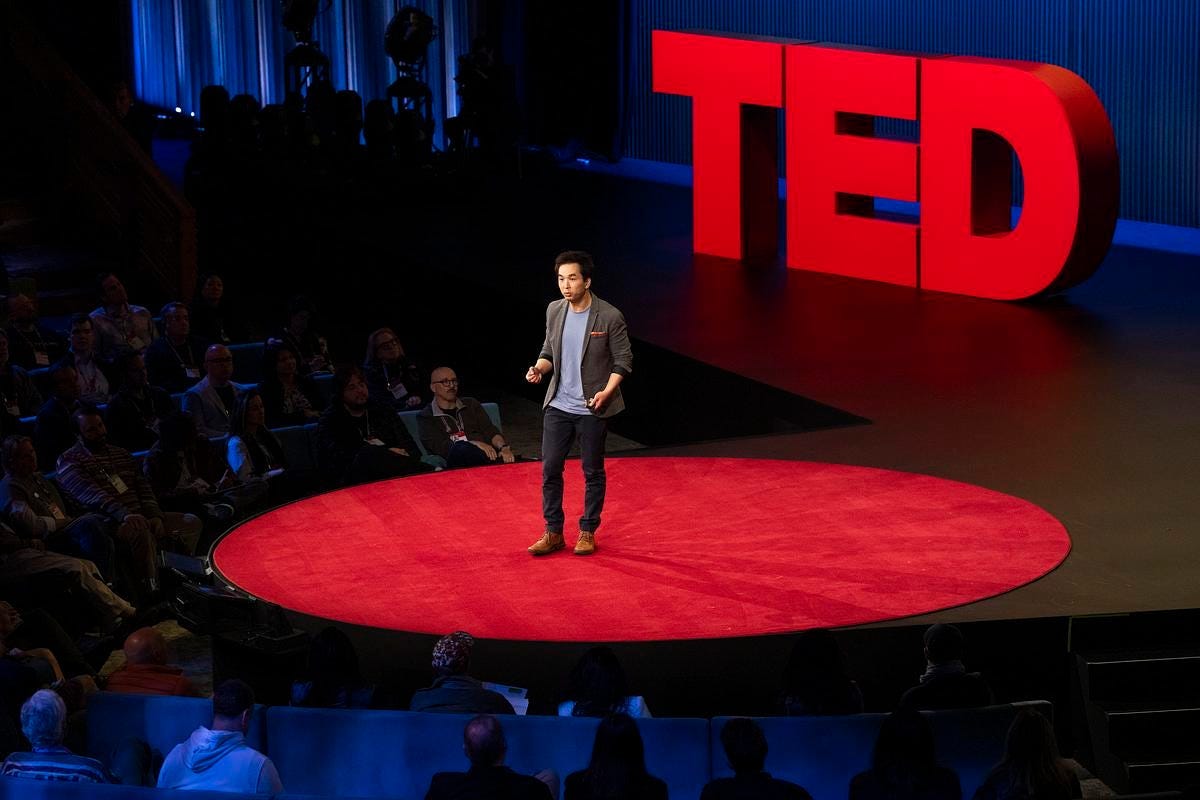
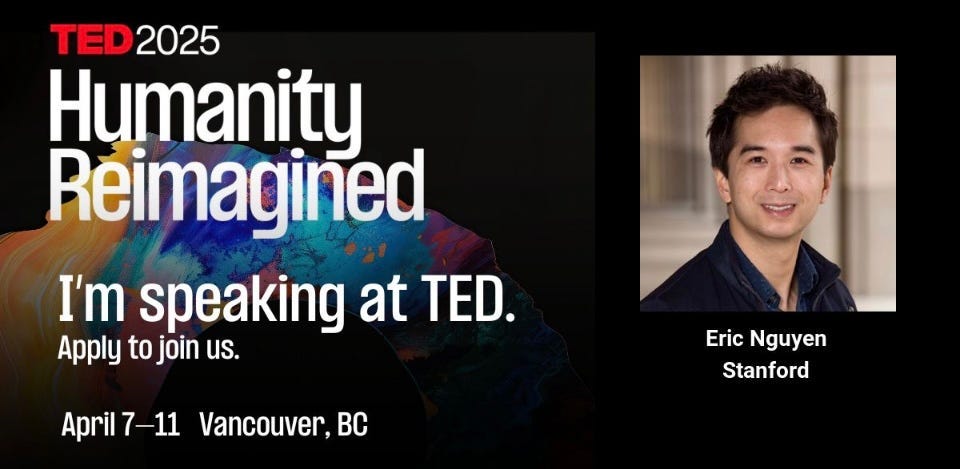
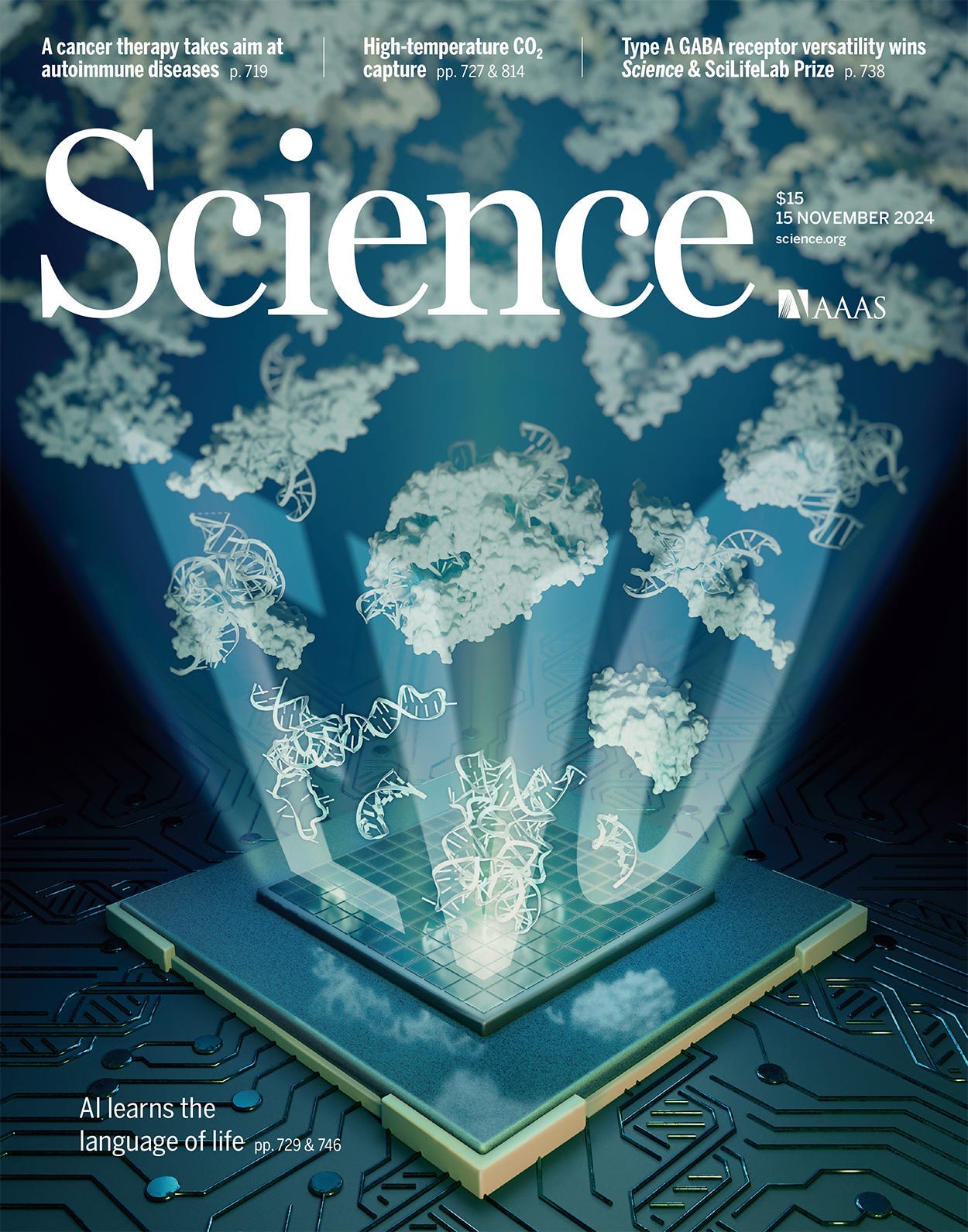
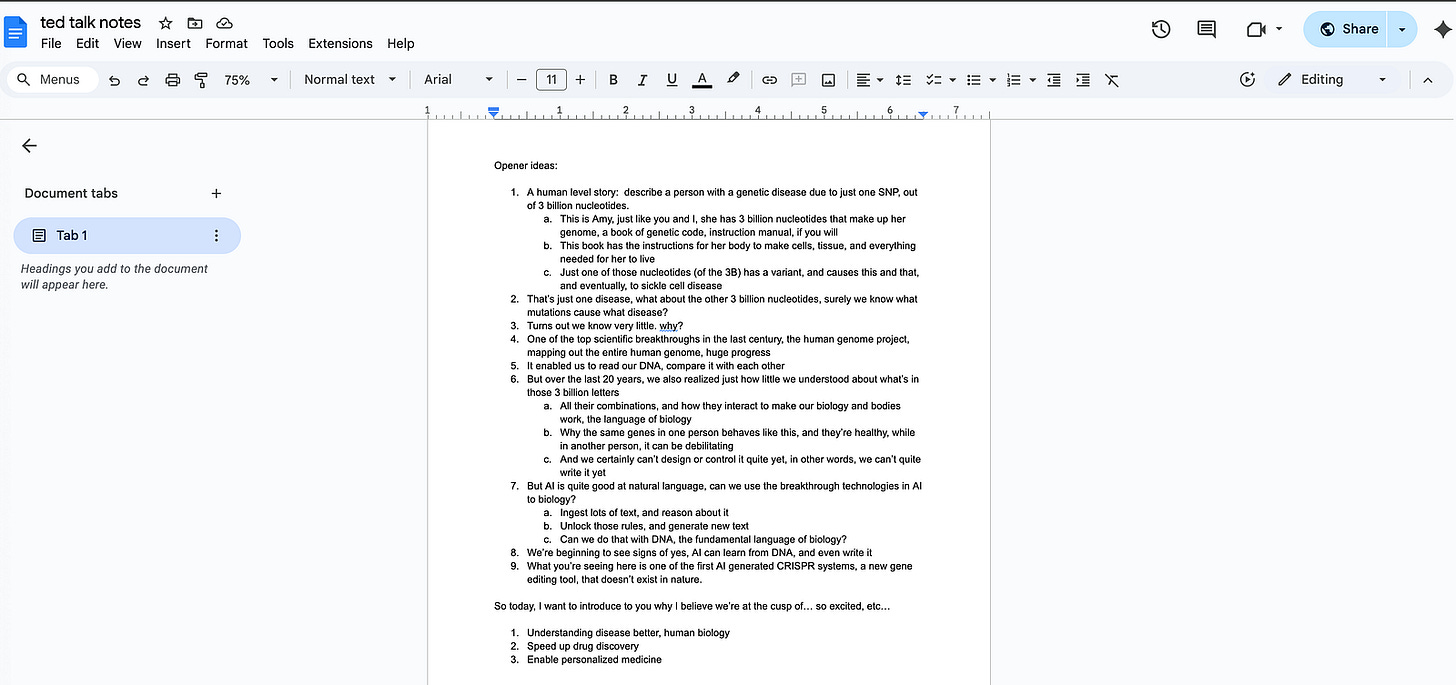
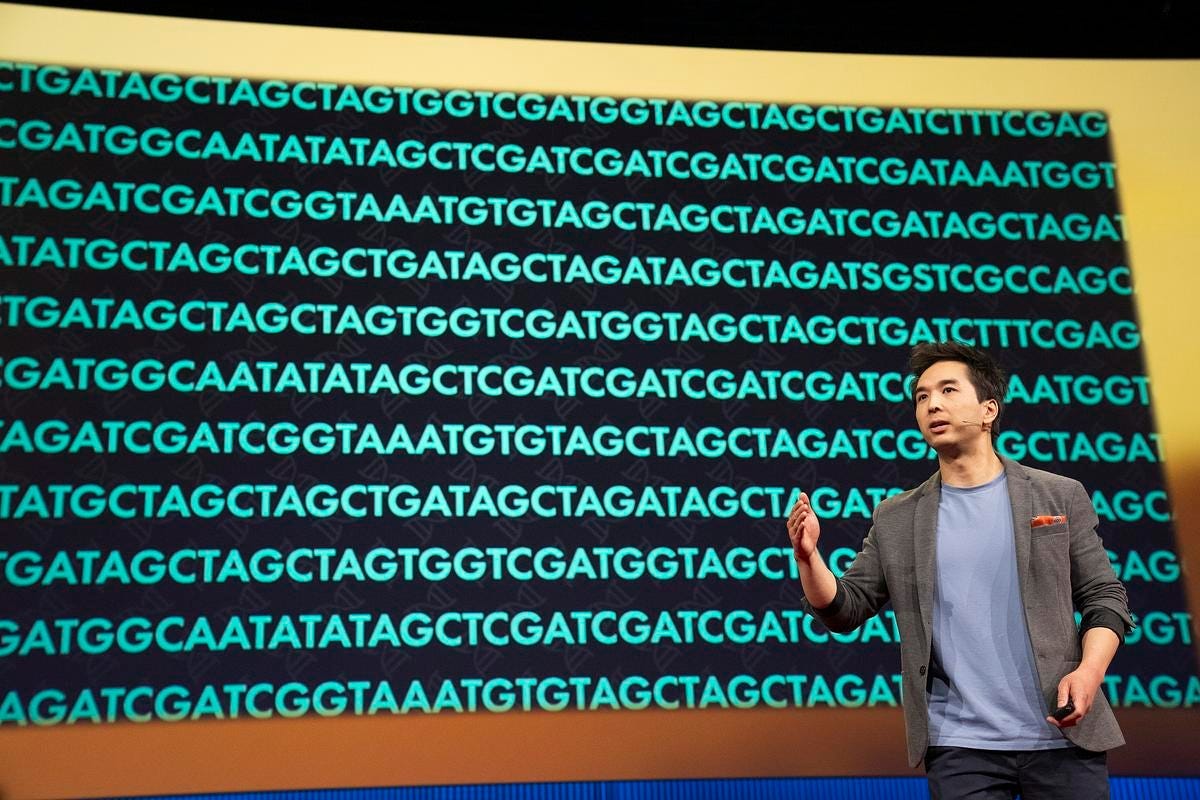
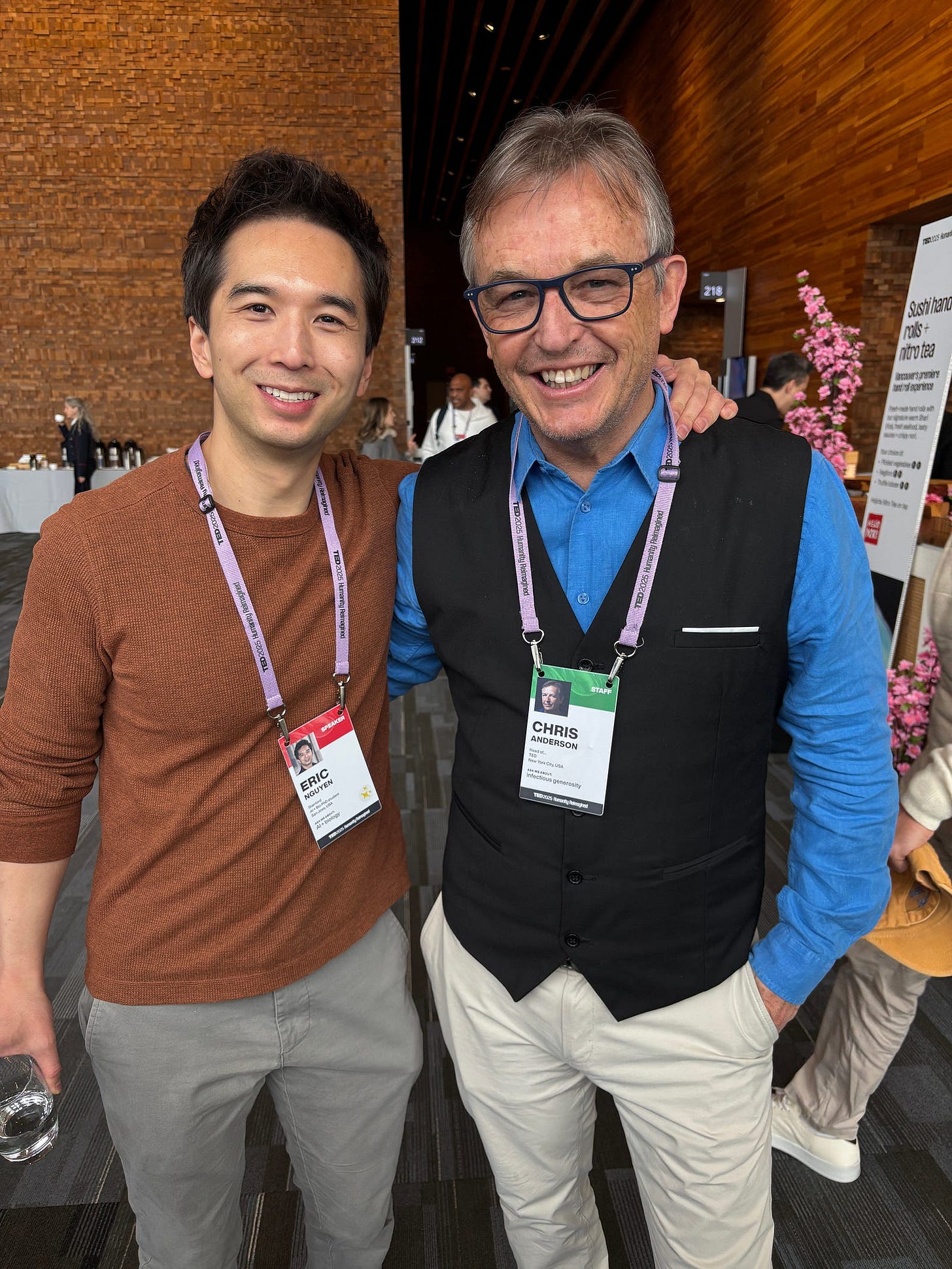
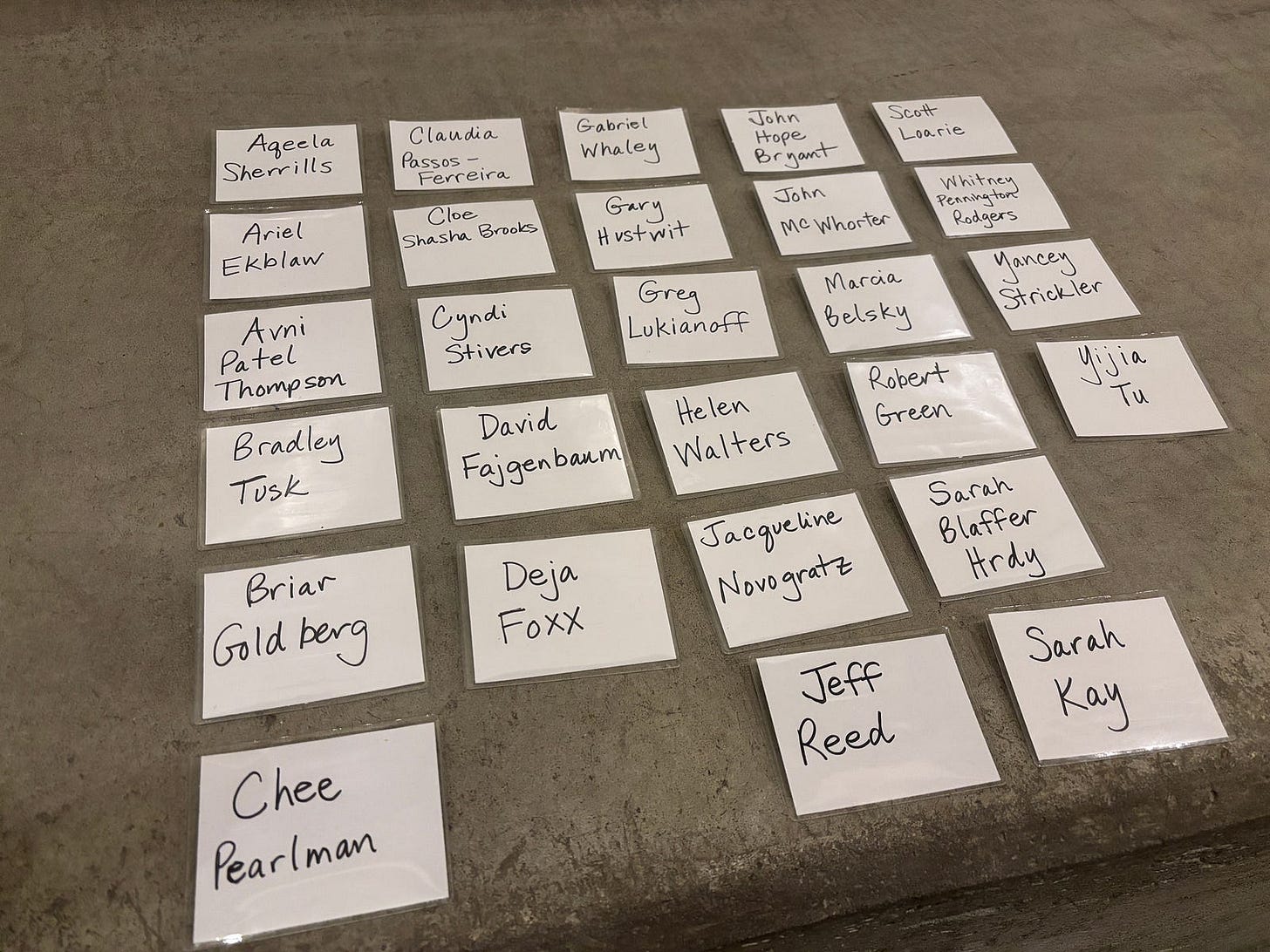

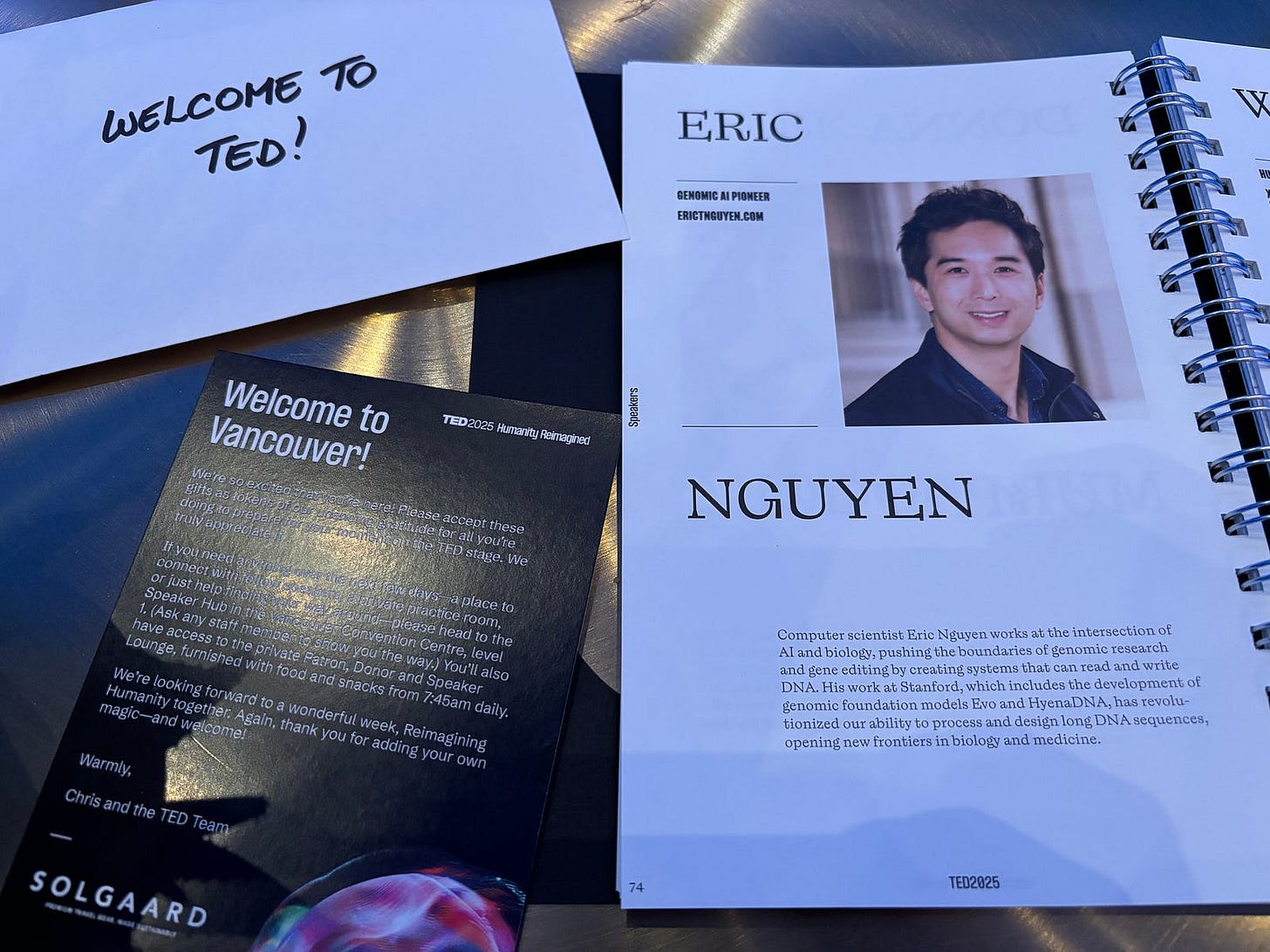
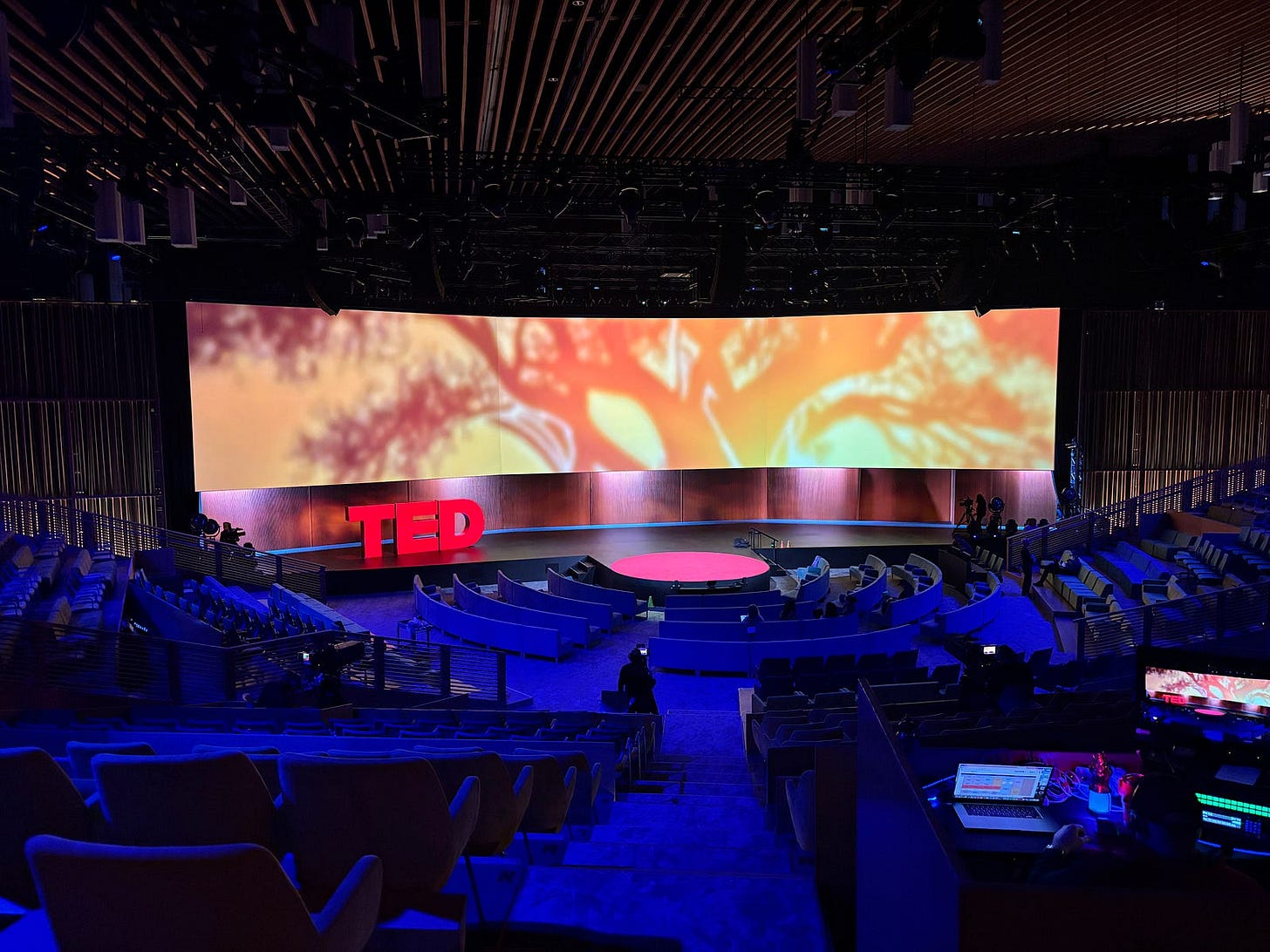
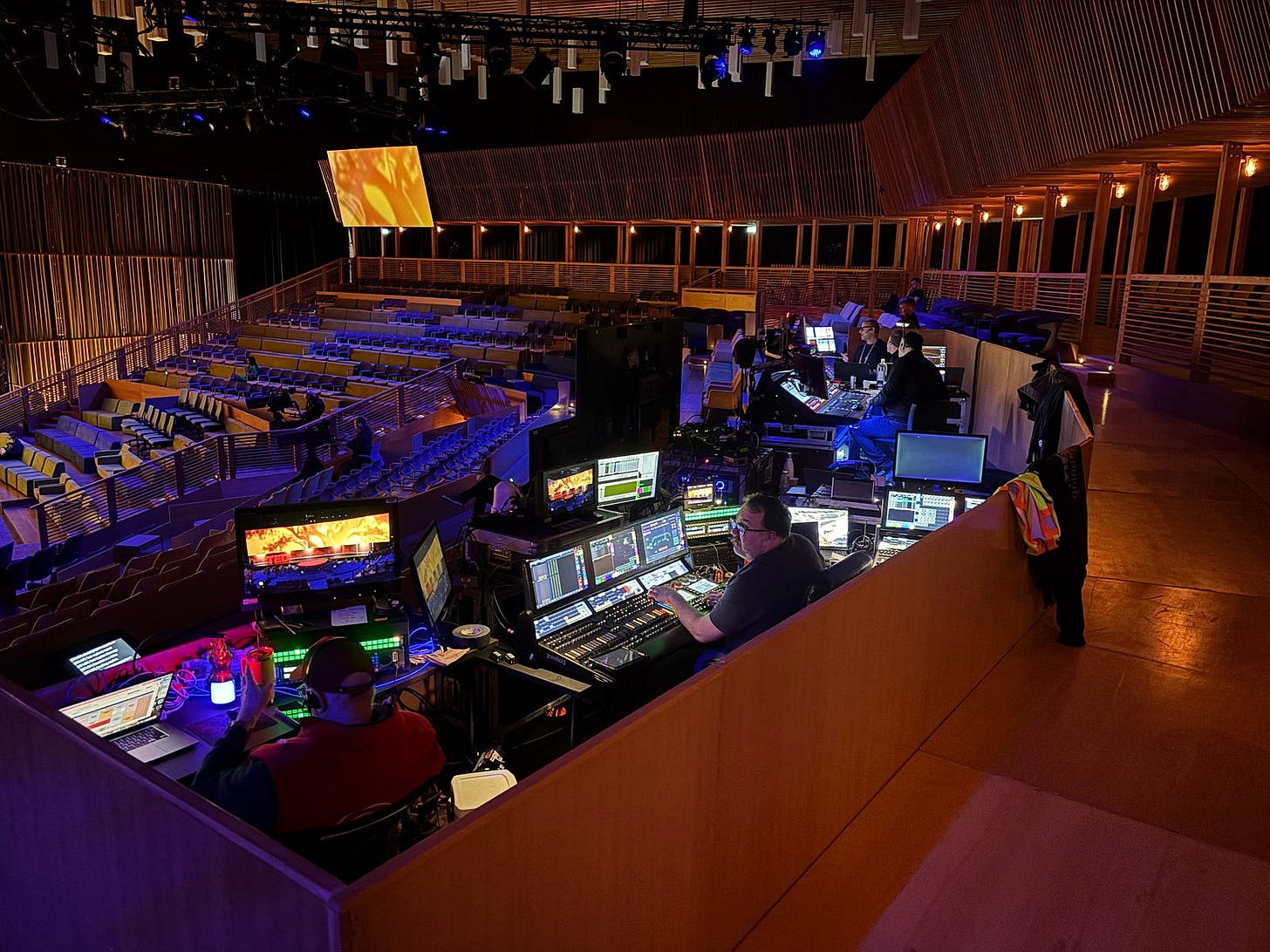
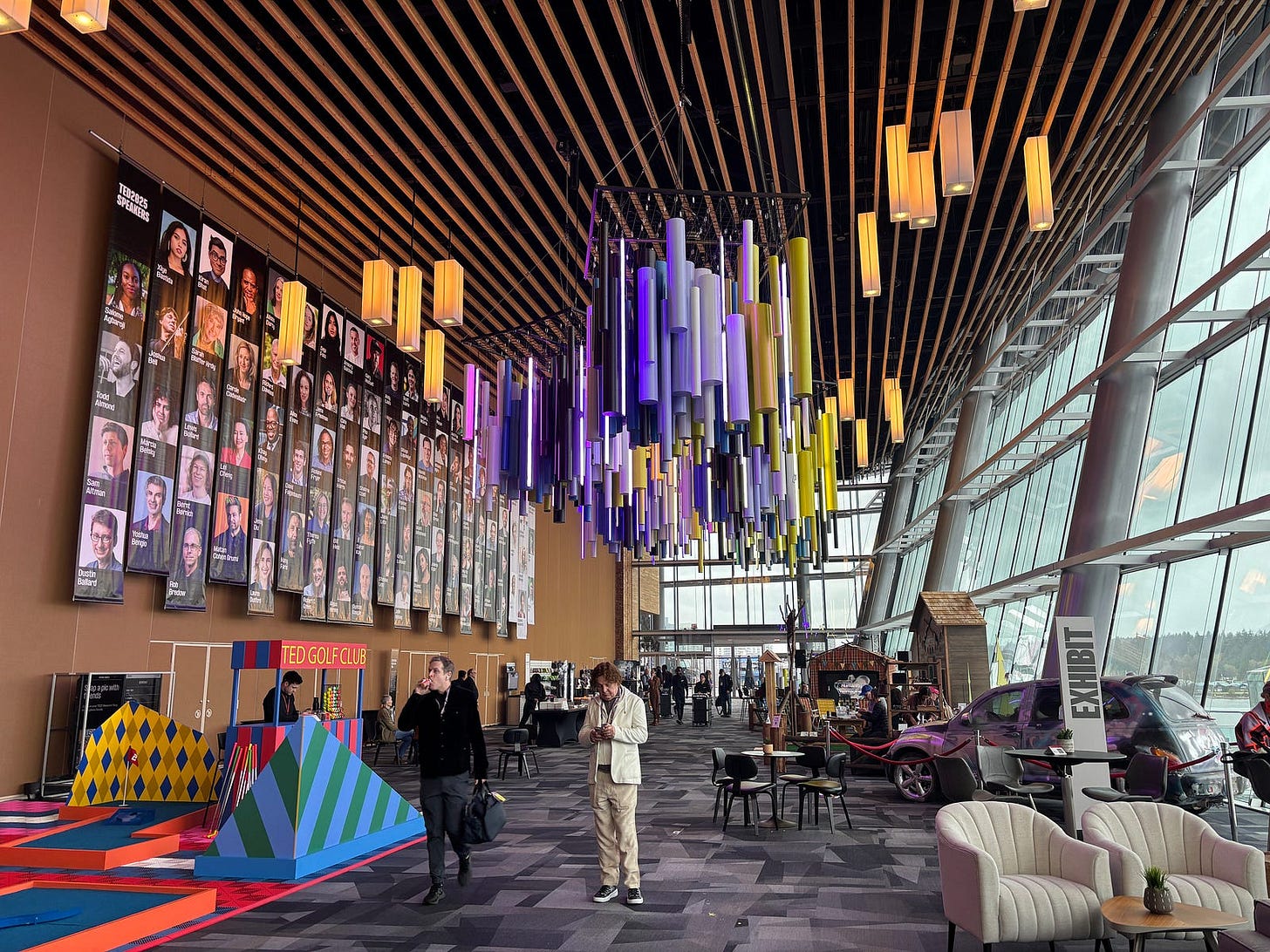
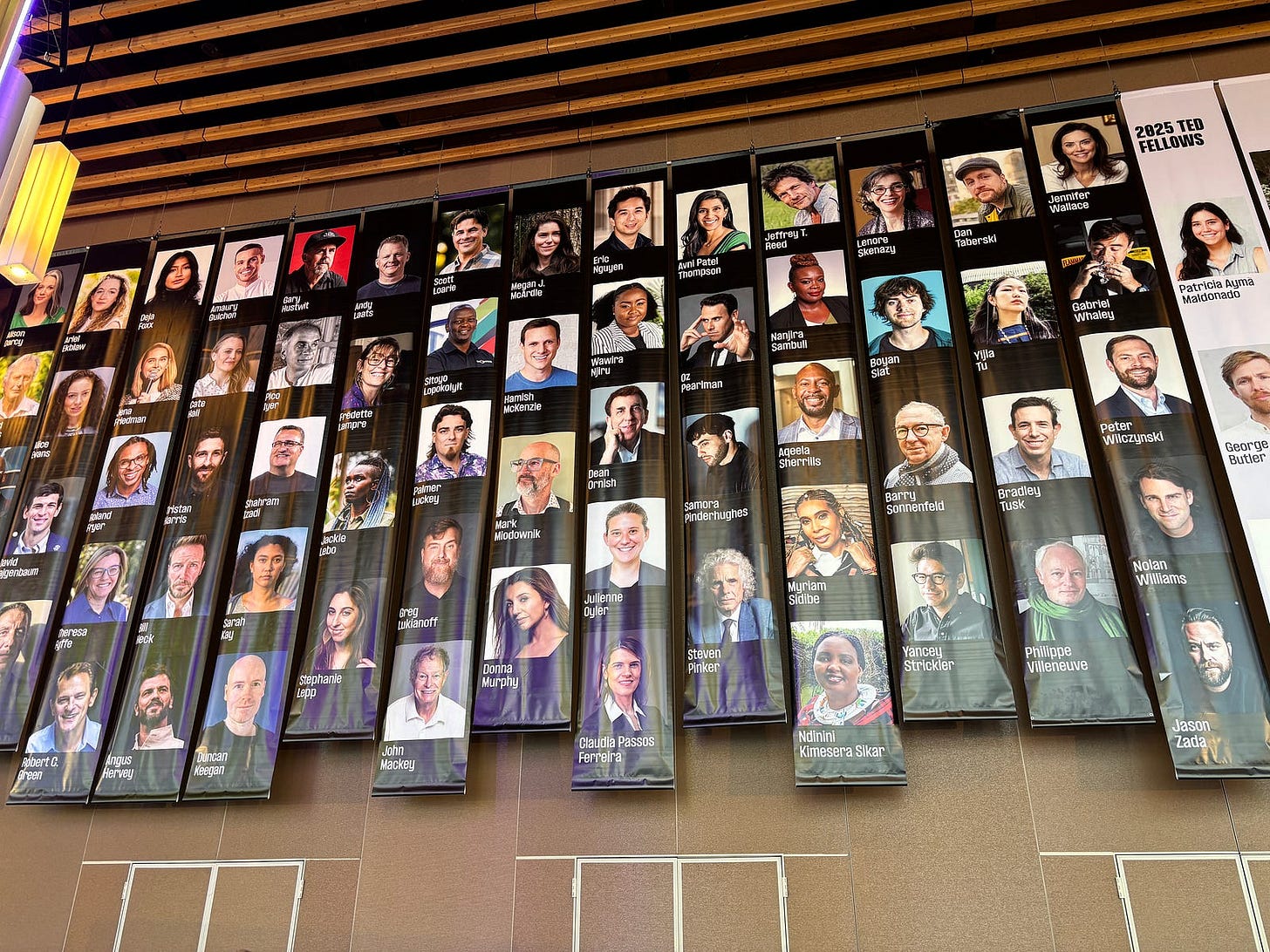
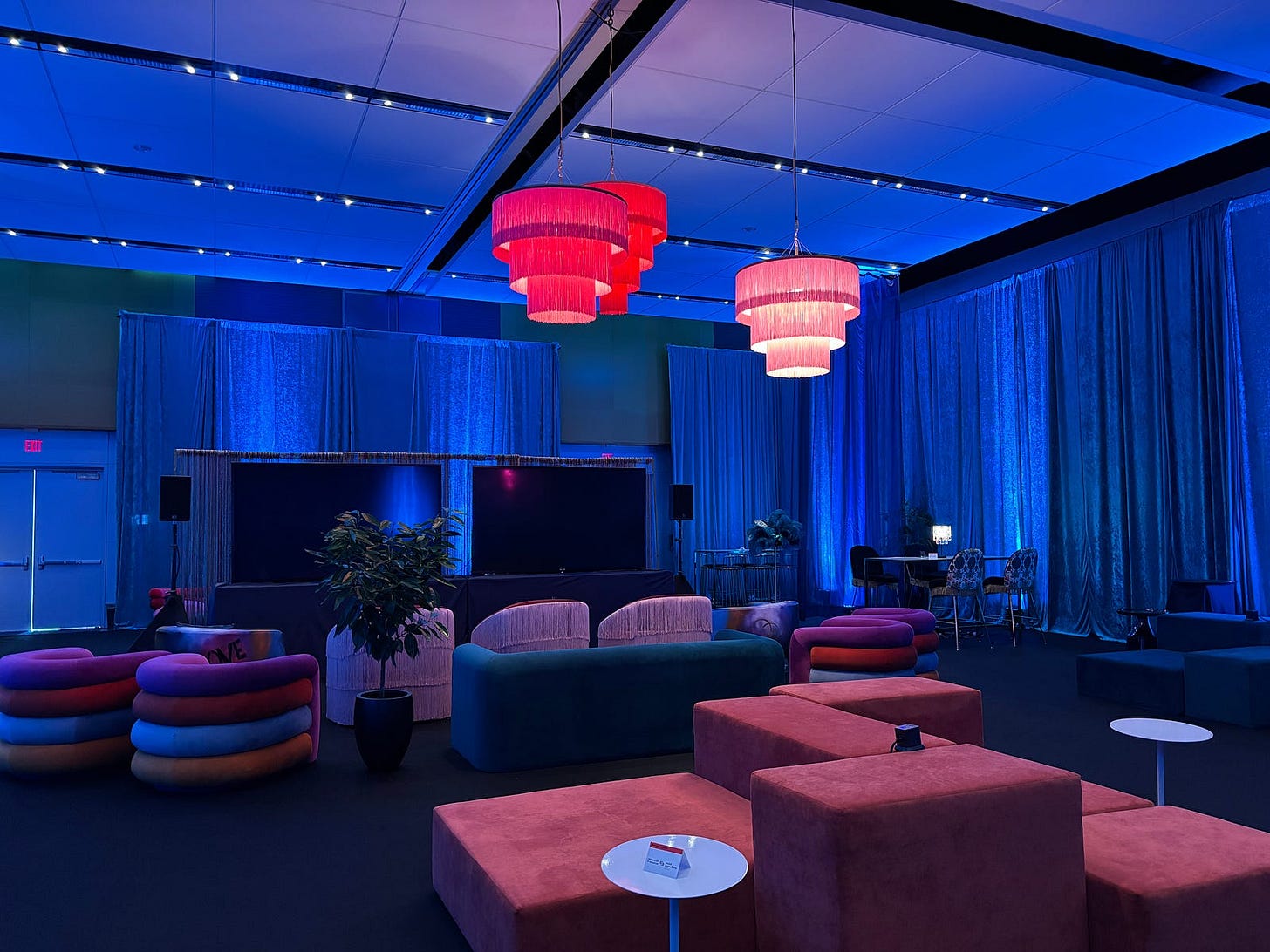
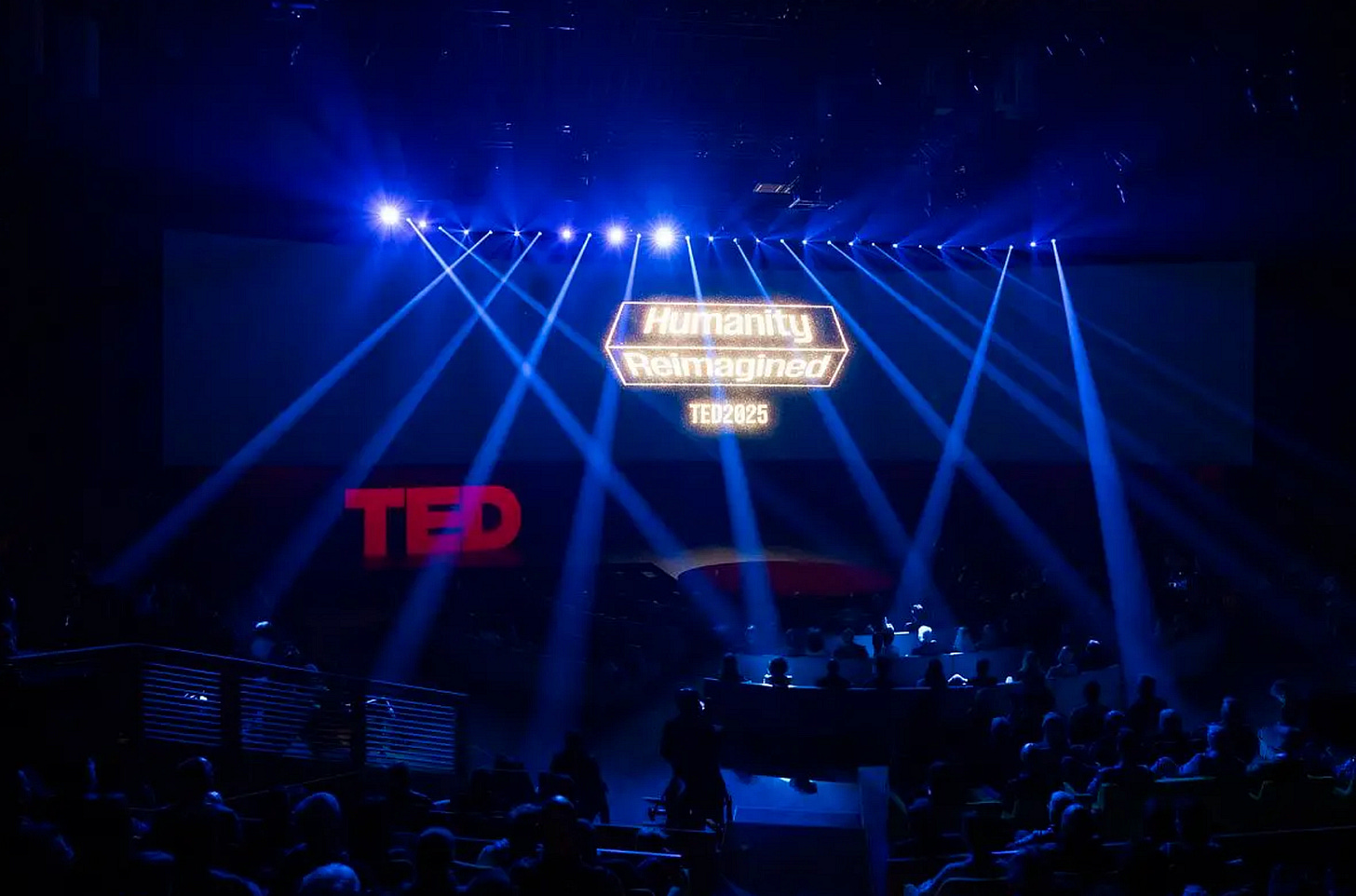
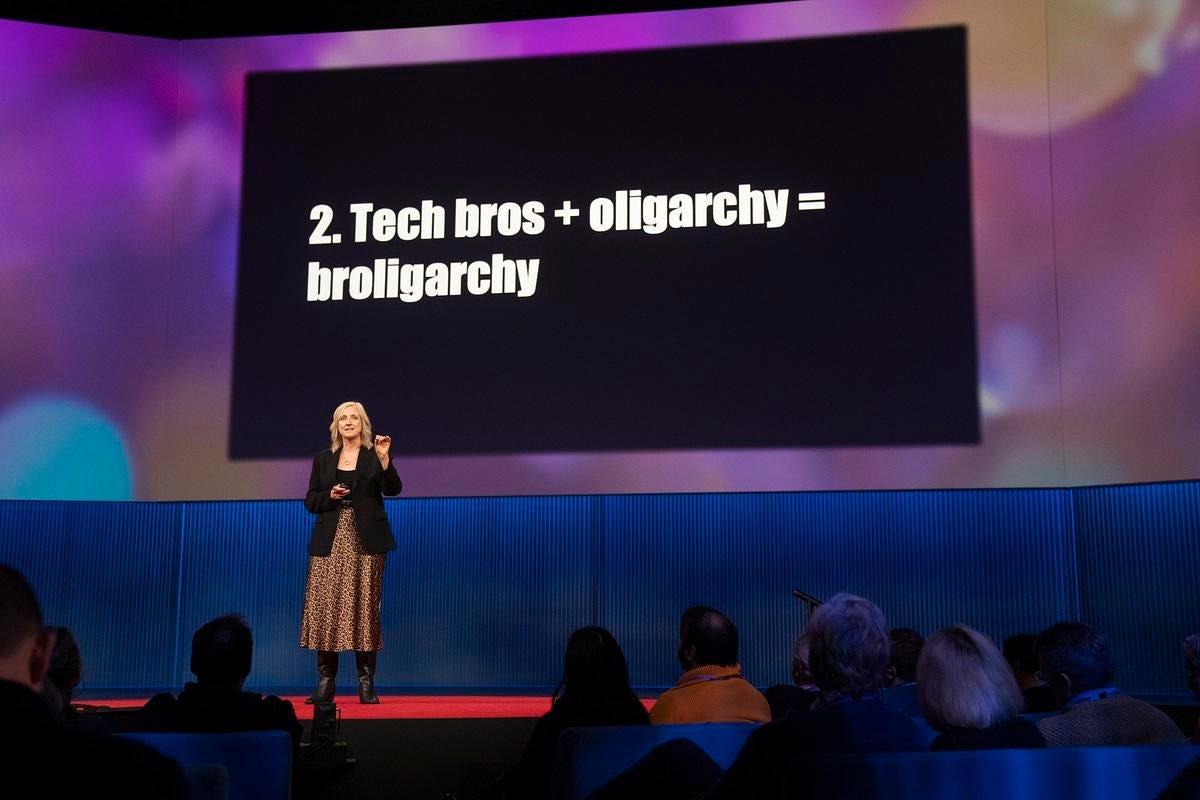
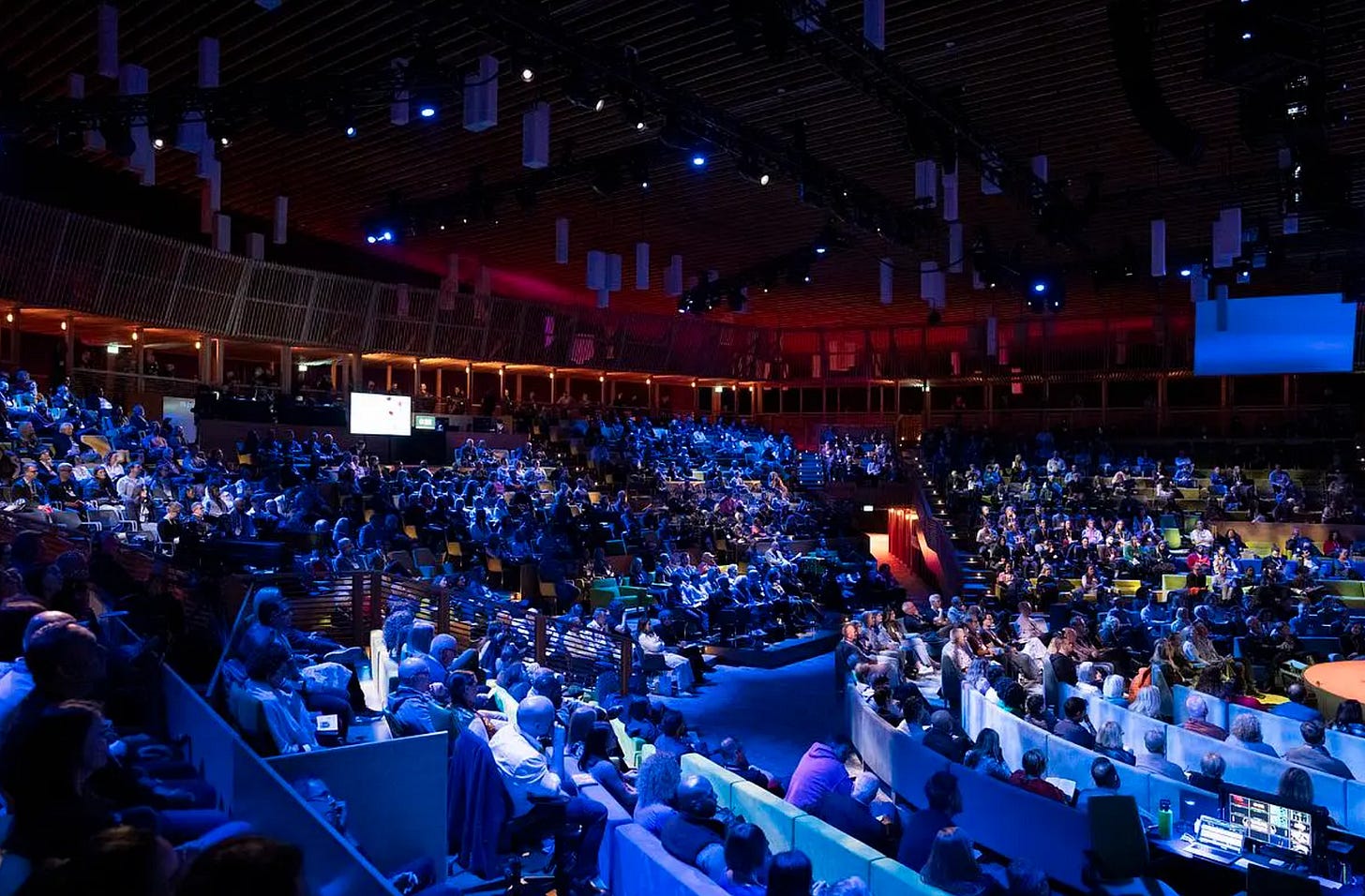
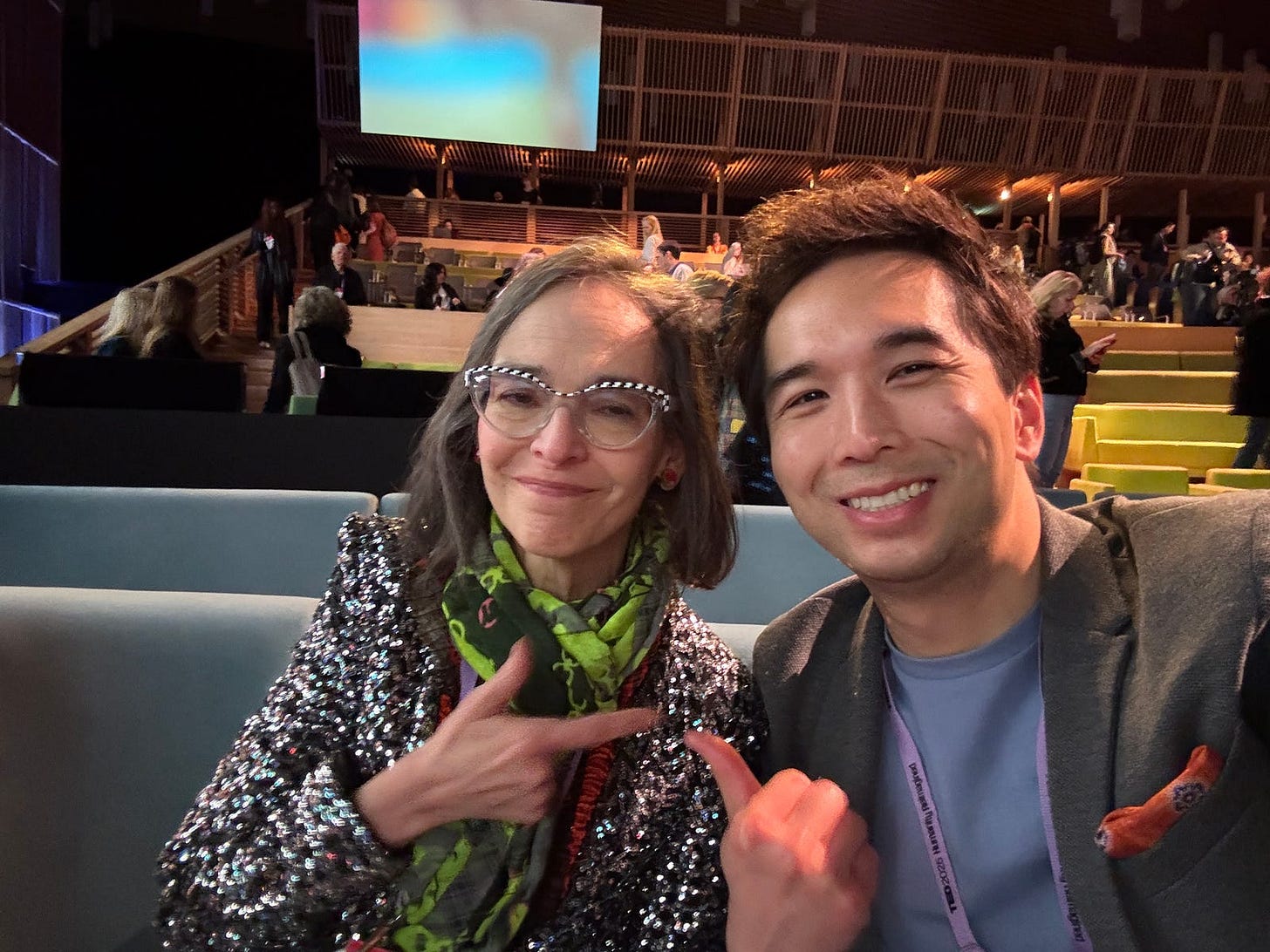
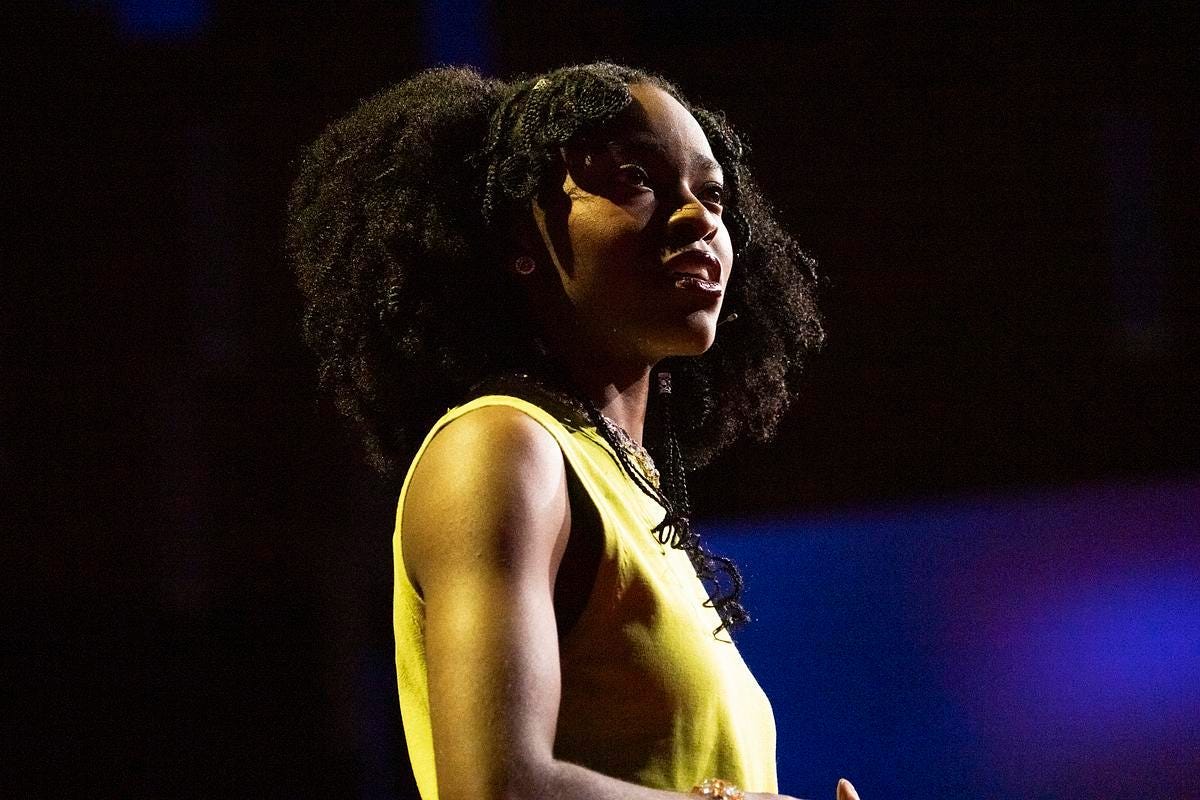
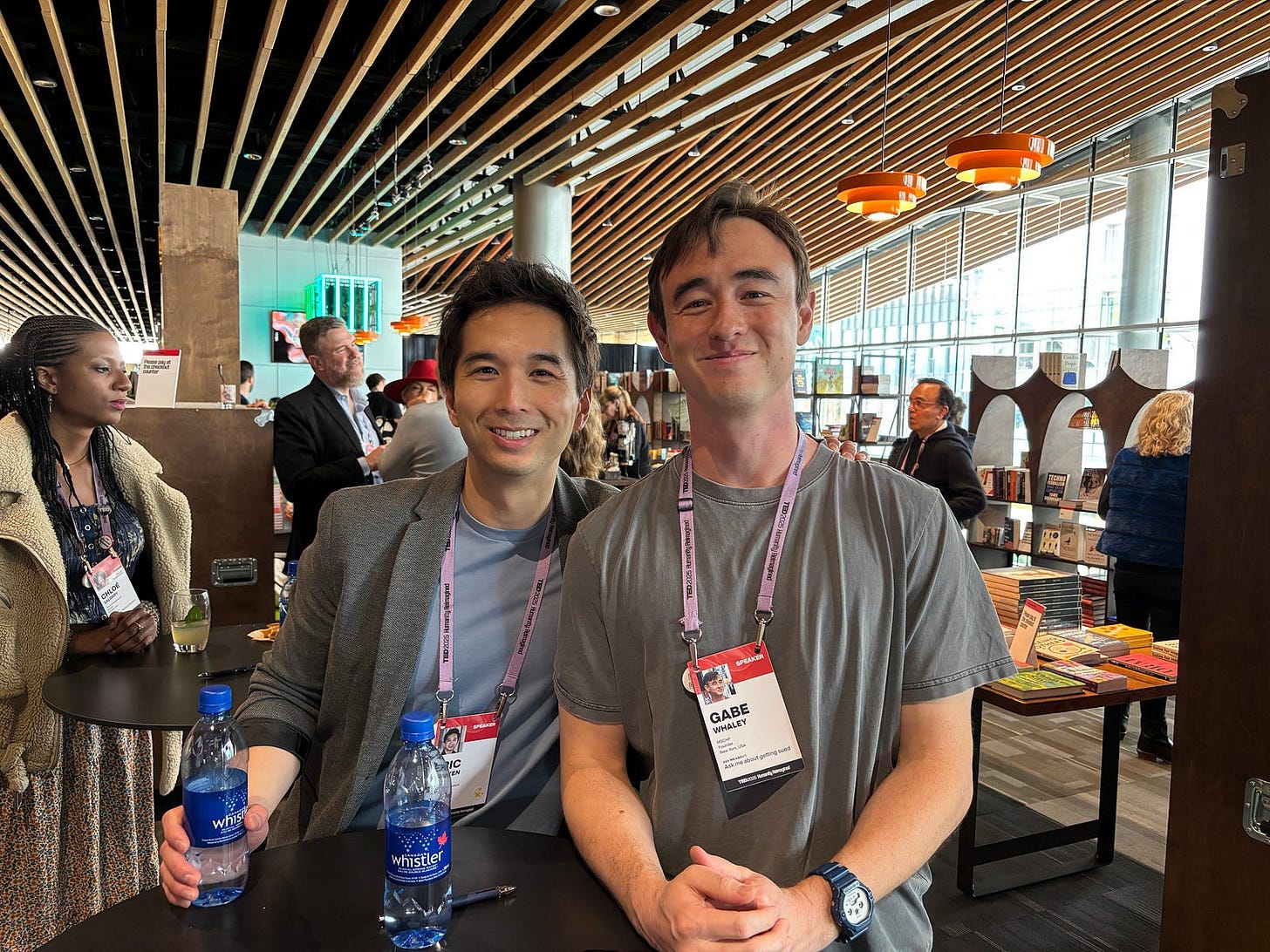
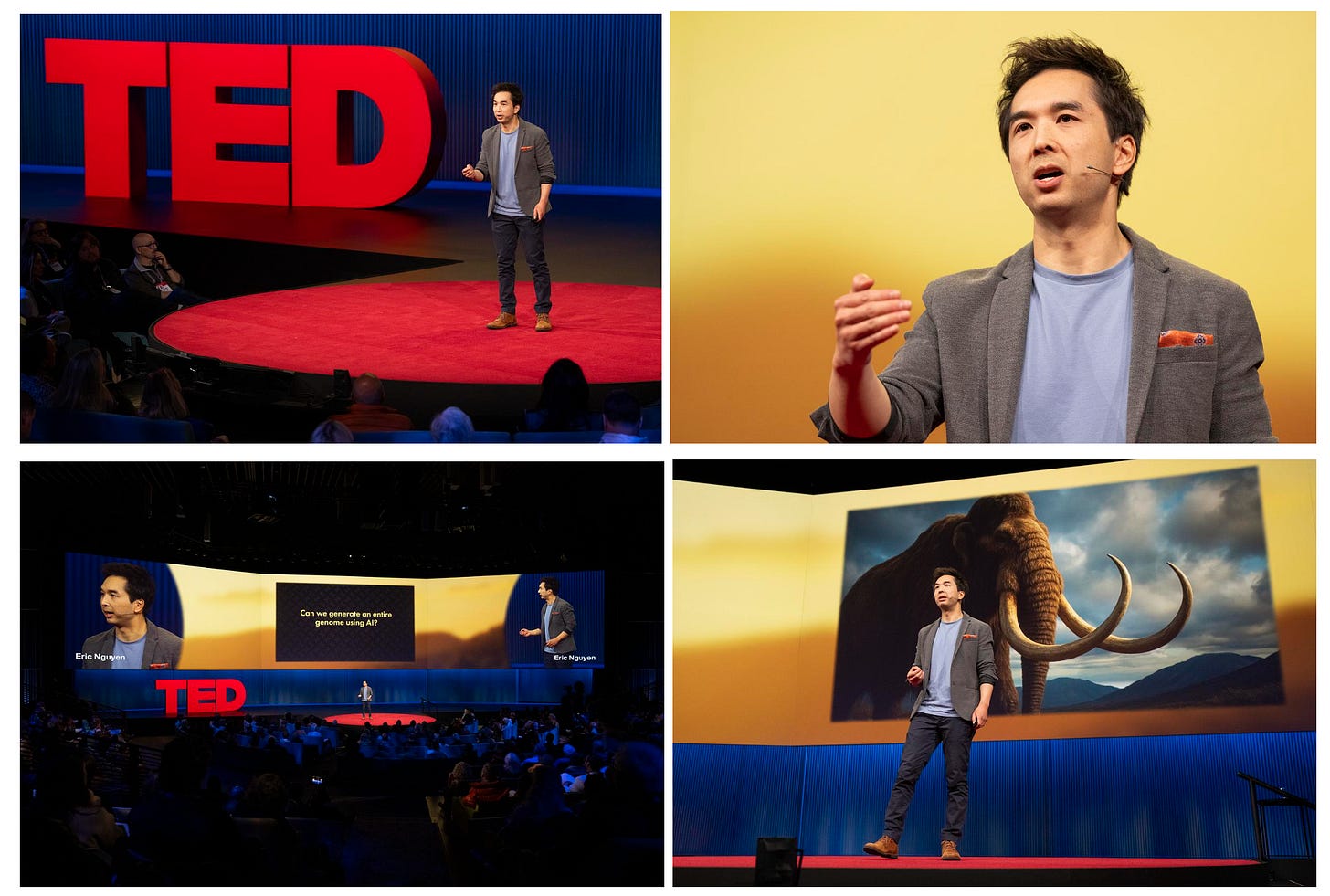
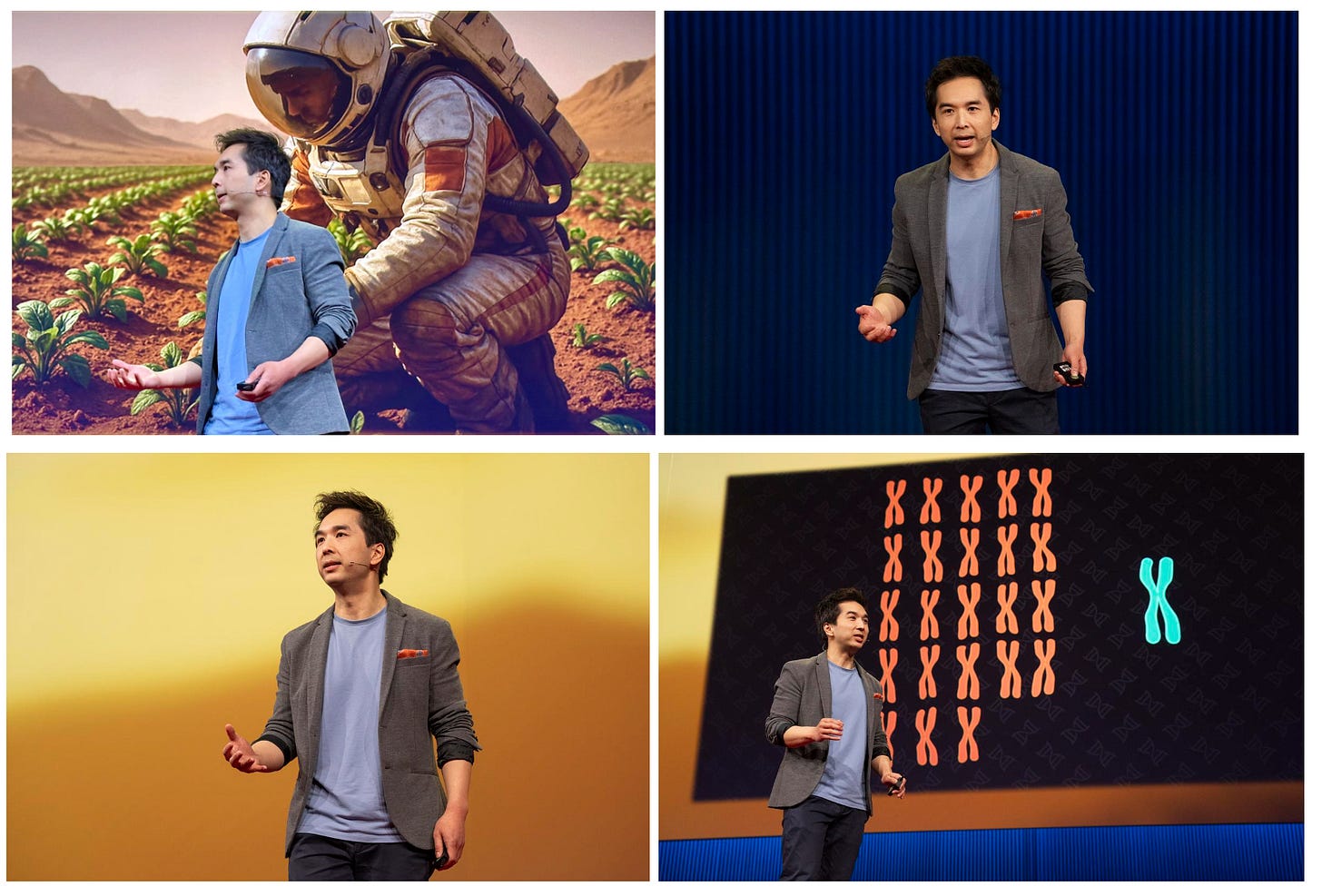
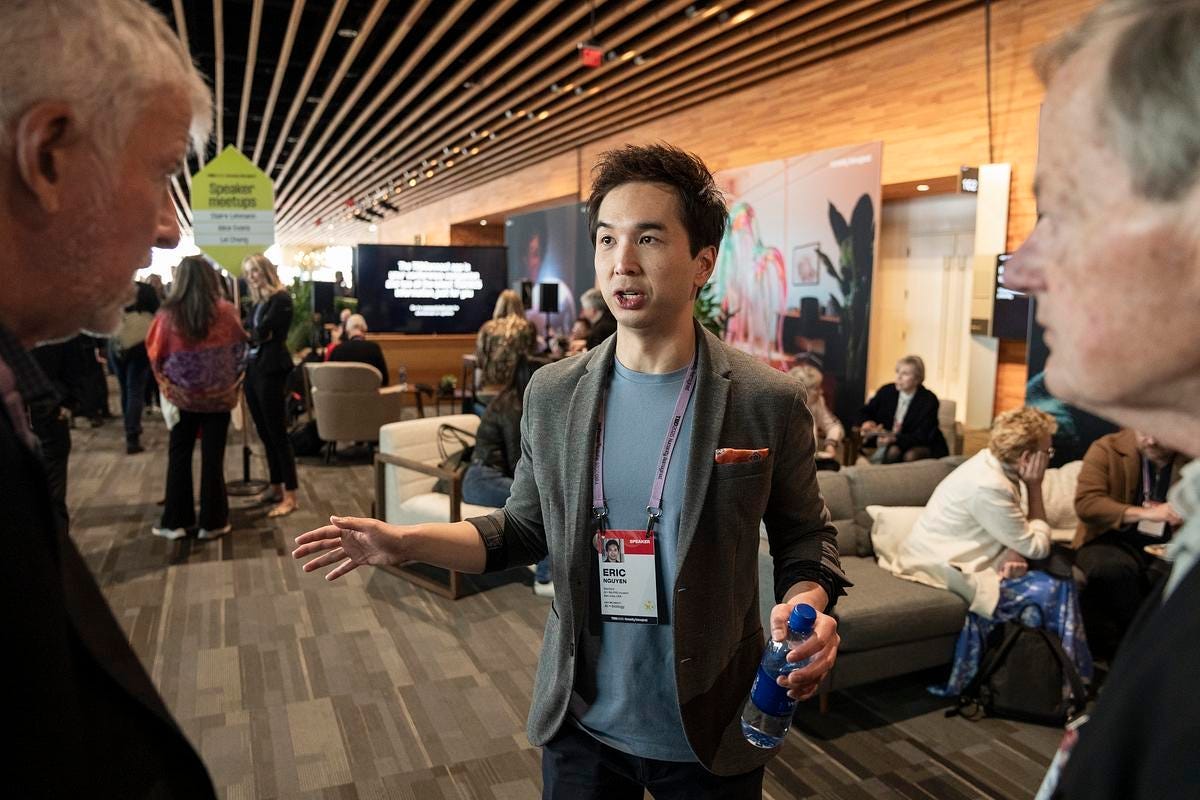
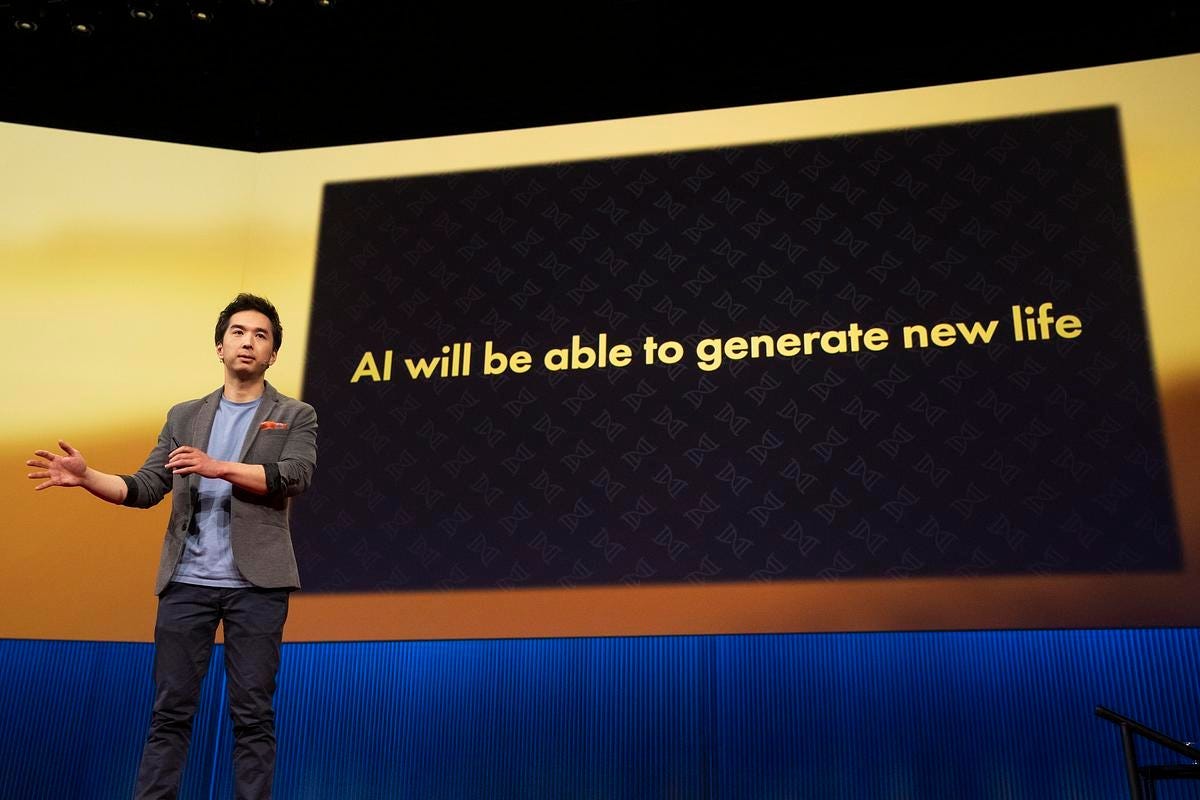
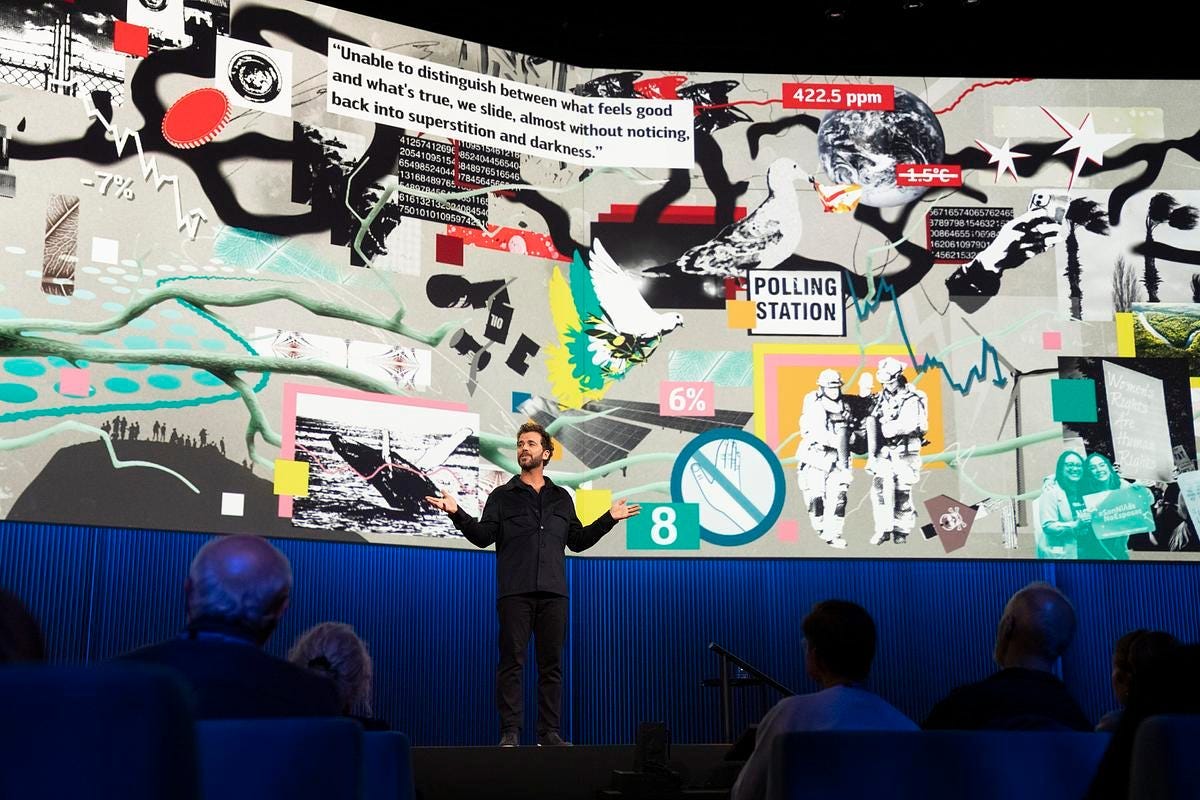
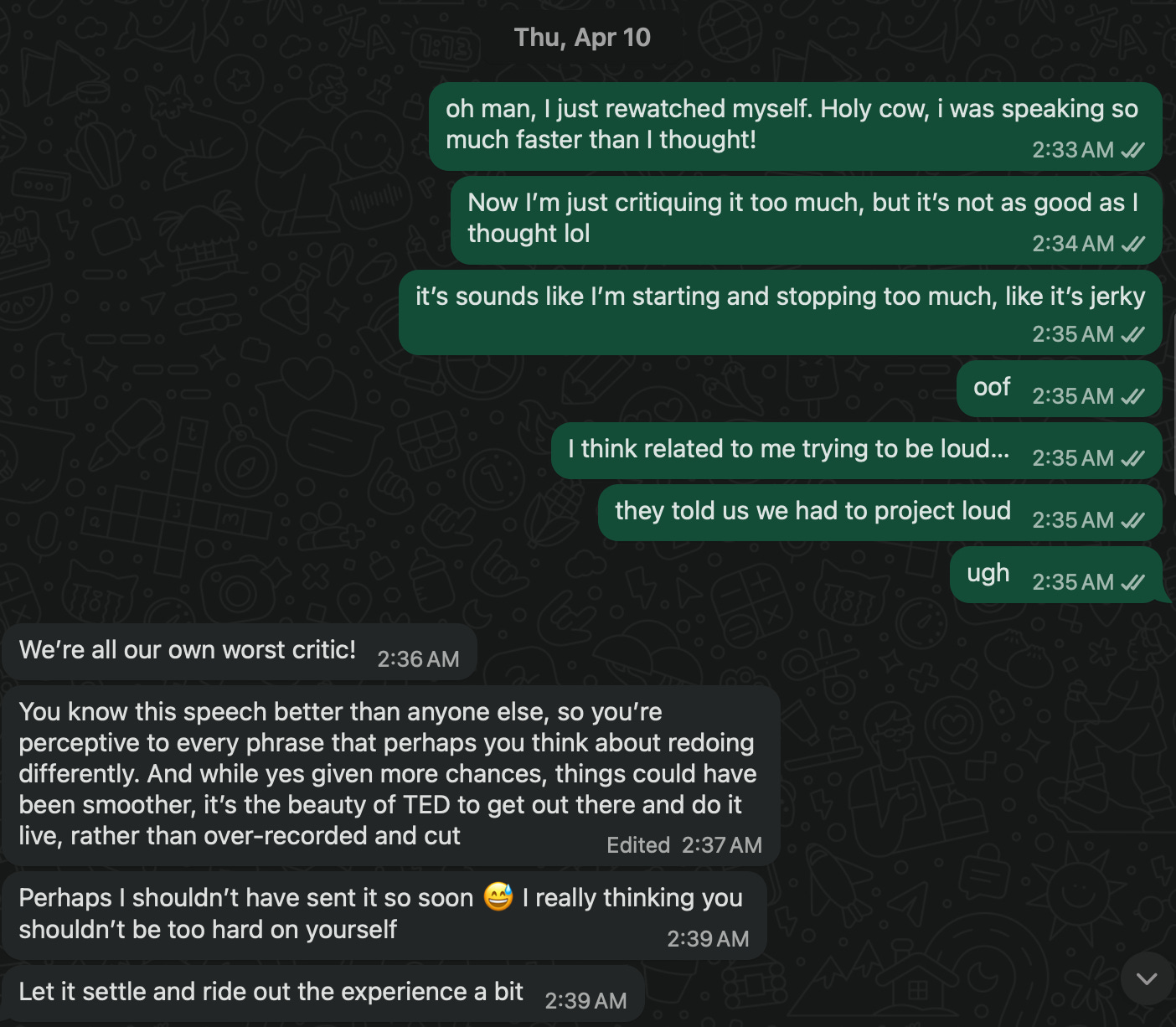
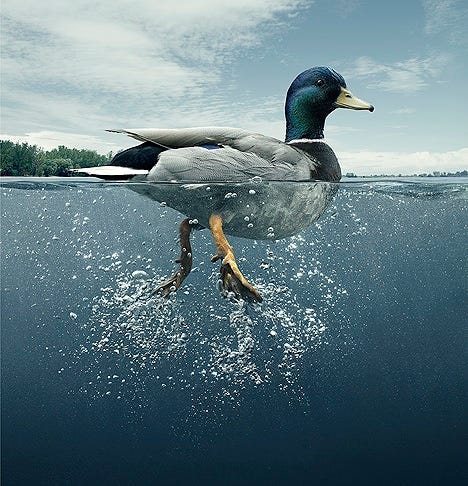
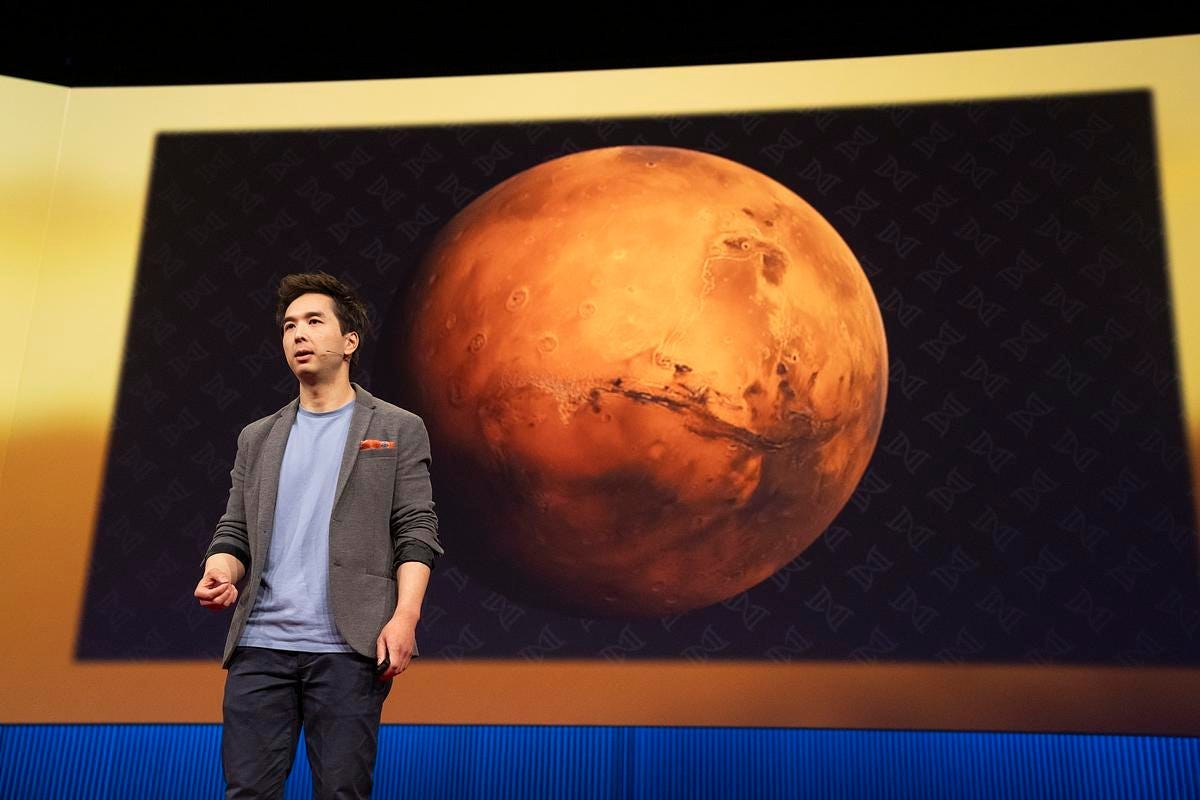
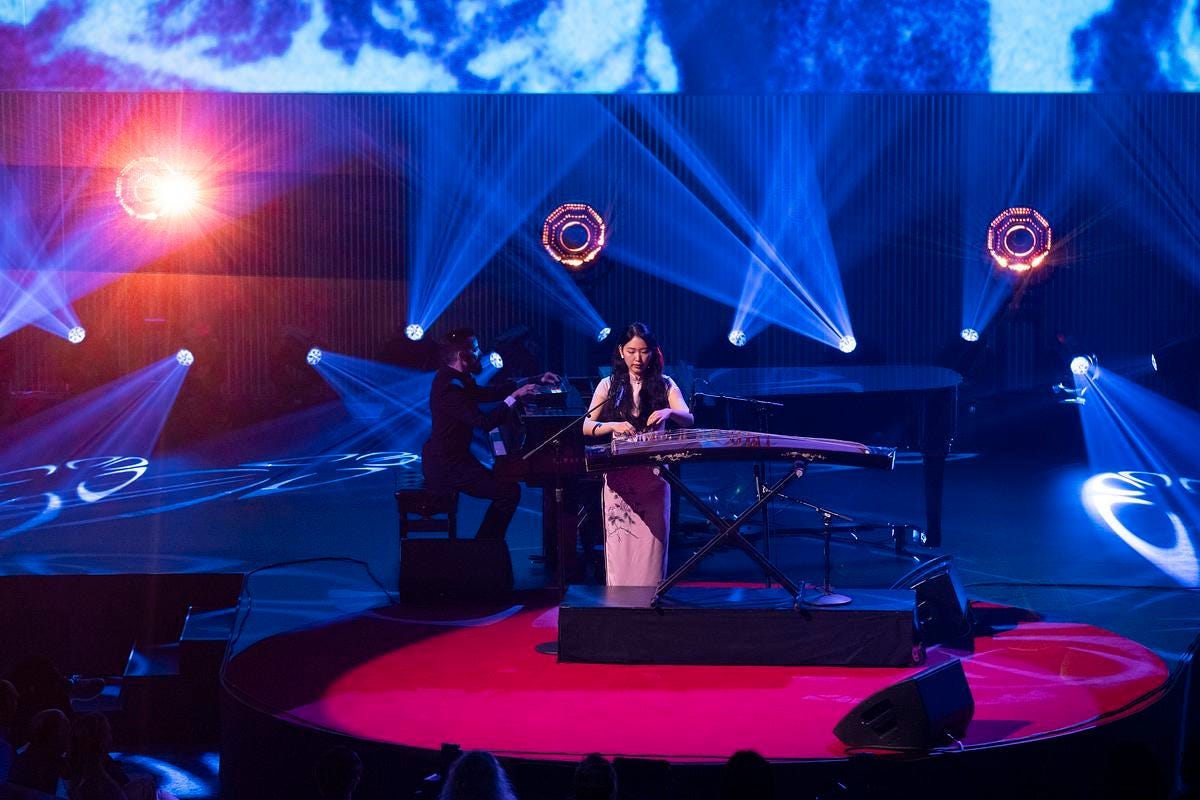
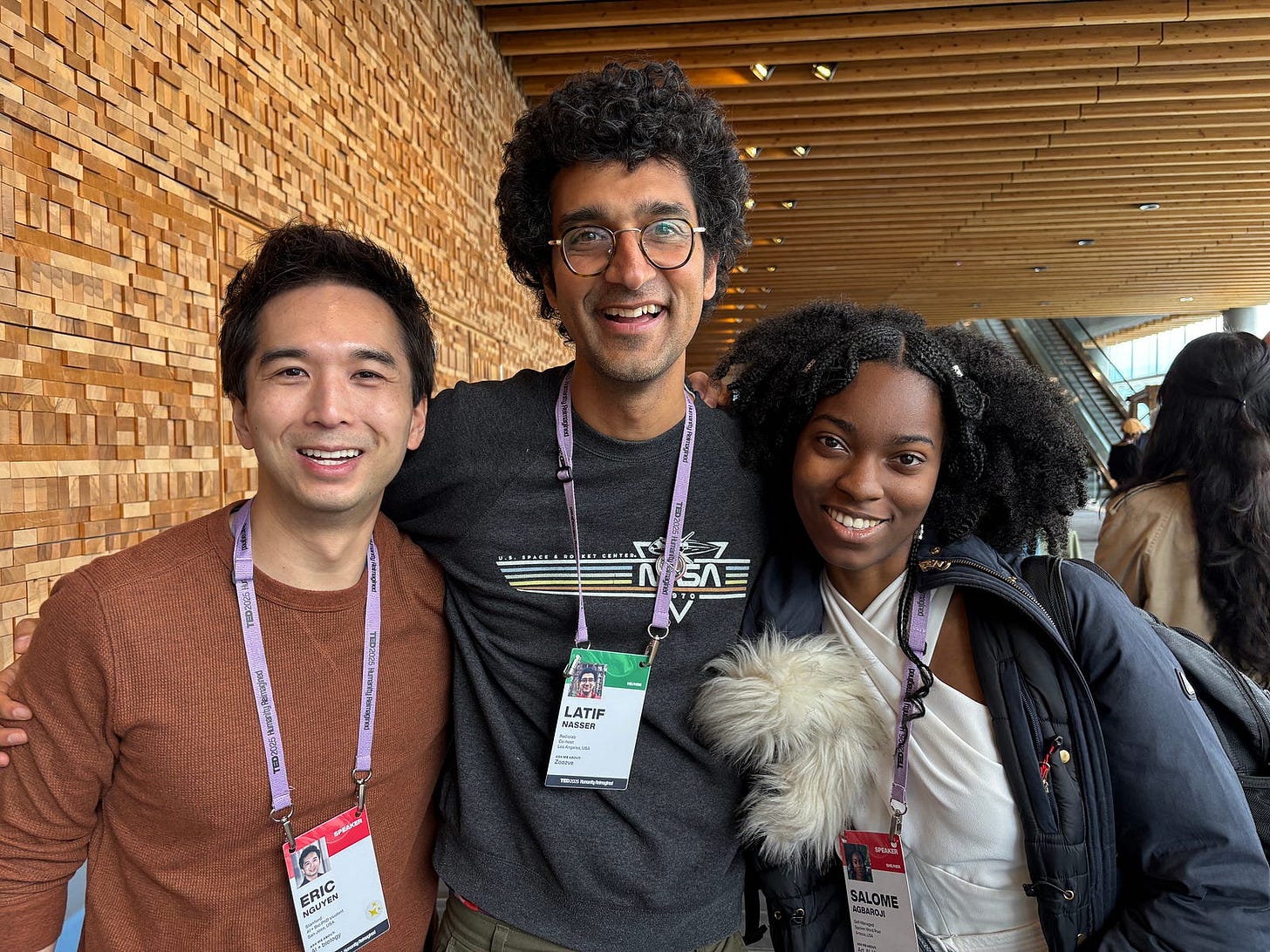
Thanks for sharing this, lovely read